





The Moose Jaw Humane Society (MJHS) has kicked off its annual 4 Paws Lottery, offering residents a chance to win big while supporting animals in need during its largest fundraiser of the year.
This year’s lottery features five cash prizes up for grabs — including four draws of $500 each and one grand prize draw for $10,000 — set to take place at the shelter starting at 1 p.m. for one day only on Monday, July 7.
“It’s a vital fundraiser for us,” said Kelsey Leschasin, fundraising co-ordinator for the MJHS. “Tickets are one for $20, three for $50, or five for $75.”
Unlike previous years, all five draws will take place on the same day this summer.
“There’ll be five draws that day,” Leschasin confirmed. “Last year we did them on separate days, but we’re doing one draw day for all of the prizes.”

Proceeds from the lottery go directly toward shelter operations, helping cover the costs of food, medical care,
and housing for animals in need. Leschasin said the fundraiser plays a critical role in keeping the humane society
running.
On behalf of the MJHS, Leschasin also acknowledged the generous support of its sponsors, including: Cypress Concrete, Pet Valu Moose Jaw and Regina, Valley Farm & Ranch Supply, Devo’s Car Wash, Family Pizza, Leipert Financial, and Casino Moose Jaw.
“(I would like to say) thank you to our sponsors, and thank you in advance for your support,” she added.
To purchase your tickets, email Giving@MJHS.ca, call 306-692-1517, or visit the shelter during regular business hours.
The lottery is open to Saskatchewan residents exclusively and e-transfer payments are available at the same email address. Buyers must include their full name, phone number, and email address when sending an e-transfer payment.
To learn more, visit MJHS. ca or “Moose Jaw Humane Society” on Facebook.
The Moose Jaw Humane Society is located at 1755 Stadacona Street West.
The chairwoman of the Moose Jaw Band and Choral Festival was worried that people weren’t as aware of the event as in the past, but recognition from a national organization has allayed her fears.
The Saskatoon Community Bands’ Wind Ensemble group performed in A.E. Peacock Collegiate’s Centennial Auditorium on May 13, and during an intermission, festival organizers and a dozen Kinsmen Club members came on stage — the crowd gave them an enthusiastic ovation — to receive the Canadian Band Association’s (CBA) Community Builders Award.
Kinsmen members were present because their organization started and organized the festival for decades.
Suzanne Gorman, CEO of the Saskatchewan Band Association, presented

the accolade on behalf of the national organization.
She explained that this award recognizes and celebrates individuals or organizations “who engage lifelong learners, foster community, build bridges and provide connection on a regional, provincial or national level.”
The festival has operated for 73 years


and has delivered successful experiences to groups from Saskatchewan, Manitoba and Alberta, which makes it “incredibly deserving of this award,” Gorman said.
The committee has 13 hard-working and dedicated people who ensure there is a well-organized and continuously evolving festival that meets the needs of young musicians, band teachers and the community, she continued.
“Designed as a non-competitive event, the community structures the festival to (use) a variety of venues around the city, with adjudicators selected for their expertise and overall approach to education,” the provincial band association CEO said. “These volunteers know how to take a licking and keep on ticking.”
Gorman pointed out that the committee bounced back after several years of pandemic-related cancellations. While some volunteers quit, organizers rebuilt that team and hosted a successful festival in 2023 — only to face teachers’ job actions in 2024. Yet, organizers still delivered a successful event despite contract negotiations and school sanctions that forced many bands to cancel at the last minute.
Gorman then presented the Community Builders Award to Janie Fries, festival chairwoman, and the Kinsmen’s Rick Evans, with the crowd giving another ovation.
Afterward, Fries said receiving the award “came as a big surprise,” noting that she spoke to Gorman last fall and expressed concern about needing to “bump up the profile of our festival” and make people more aware that it was still happening even without a downtown parade.
Gorman told her not to worry, and a week before the festival, she told the chairwoman that the CBA was recogniz-
ing the committee with an award. Fries then invited the Kinsmen since the club had organized the festival for 45 years.
It feels good that the committee’s 32 years of work have been recognized, especially by the national band association, she continued. It’s also a good feeling knowing that moving to an education-focused event instead of a competitive one was the right decision since it has helped the festival grow and meet curricular outcomes.
Fries added that the festival also enables students to attend live concerts by professional groups, opportunities that many don’t have at home.
The Kinsmen’s Evans, 81, said that “it was very nice” of the CBA to award the accolade to Moose Jaw since organizers have worked to keep the festival going despite challenges. He jokingly agreed that it only took the national association 75 years to recognize those efforts.
Continuing, he said the Kinsmen dedicated many hours to organizing the festival decades ago, with nearly 80 members pitching in. However, their numbers dwindled, so they withdrew their support in 1994 and focused on fundraising for Telemiracle.
Visit www.mjbandandchoral.org for more information about the festival.

Moose Jaw was alive with music last week as more than 100 student ensembles from across the Prairies converged for the 2025 Moose Jaw Band and Choral Festival.
Spanning four days from May 12 to 15, the event brought a joyful cacophony to venues across the city, including the Mae Wilson Theatre, Hillcrest Apostolic Church, A.E. Peacock Collegiate, the Crescent Park Amphitheatre, St. Aidan Anglican Church, and Zion United Church.
Students from Saskatchewan, Manitoba, and Alberta showcased their talents in concert bands, jazz ensembles, and choirs, performing for peers, fami-


Aaron Walker - Moose Jaw Express
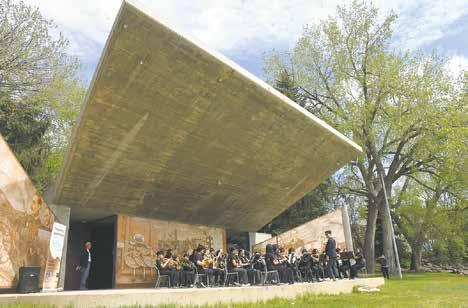
lies, and a panel of experienced clinicians. The festival’s philosophy — that music should be educational and fun — guided the event, as groups performed not to compete with one another, but to receive real-time coaching and critiques to help hone their sound.
A fan favourite, “Moosic in the

Park,” returned to Crescent Park Amphitheatre on May 13 and 14. Sponsored by Visit Moose Jaw and Deja Vu Café, the outdoor lunchtime concerts offered performers a chance to shine in a relaxed,


sunlit setting.
Backed by dedicated volunteers, directors, and generous sponsors, the festival once again celebrated talented young musicians, directors, and the power of live performance. Organizers expressed heartfelt thanks to all involved, with a special thanks to students: “You are the reason we do what we do.”
From first-time performers to seasoned high school ensembles, the 2025 Band and Choral Festival hit all the right notes — promising a bright future for many young musicians.



Join Michael Penner for an infor mal 90 Minute Seminar. Your free meal is cour tesy
Tuesday, May 27
Houston Pizza
Tuesday, June 3 rd ~ Rodo’s Pizza Event Room

The Mae Wilson Theatre is a special place for Saskatchewan musician Jeffery Straker, as the venue was the first “big theatre” he performed in when he began his career 19 years ago.
While he has played several shows in Moose Jaw since then, the folk-roots singer-songwriter and pianist is still thrilled to return to the “Carnegie Hall of the Prairies” to support the community.
Straker and his band will perform on Thursday, June 5 at 7:30 p.m., for a fundraiser The Friendly City Optimist Club is holding to support children and youths. Tickets are $36 each and can be purchased at moosejawculture.ca or from the box office.
“It’s a great opportunity. I was honoured when they reached out and asked if I would be interested in doing such a thing,” Straker said.
The musician pointed out that he has collaborated with many Saskatchewan groups to support communities, with the 20-hour telethon Telemiracle his most notable contribution. However, he noted that this is the first time he has done anything with an Optimist Club or that is youth-focused.
Helping youths is important, especially today where being young “is a
tricky thing to manoeuvre” since social media can make life difficult, Straker said. Furthermore, many pressures and stresses cause young people to question whether they are adequate or enough.
“That the Optimists are doing all sorts of programming in Moose Jaw … it’s great,” he continued. “It’s just a way to remind young people that community is out there, it’s looking out for them (and) it’s something they can be part of … .”
During this show, Straker will use a “gorgeous grand piano in that beautiful old turn-of-the-century theatre” to perform songs he wrote during his nearly two-decade-long career. However, he will also perform tunes from his recent Prairie-themed album, “Great Big Sky,” which received the 2025 Contemporary Singer of the Year Award from the Canadian Folk Music Awards in April.
During his show, the singer-songwriter plans to banter with the audience and tell stories about the songs he wrote. He will attempt to weave together the entire night “as a bit of an escape” to help people forget about their lives for a few hours and take them on a musical trip.
“I have a feeling there’s going to be





a really nice feeling of community and camaraderie … . I think it’s going to be a nice warm night,” he said. “I really hope the entire thing feels like a warm hug.”
Since he’s been performing for 19 years, Straker admitted that deciding what songs to play “is really tricky,” especially since he has become attached to the most recent tunes he wrote. However, he has some favourites from past
records and knows audiences also appreciate those songs — some people even email him requests ahead of time.
Besides the piano, the singer-songwriter will use a ukelele, giving him the chance to stretch his legs and perform closer to the audience. Those songs will be acoustically performed because, he noted, the theatre was built to amplify sound without enhancement.
Straker “has a real affinity for” the Mae Wilson Theatre since it was his first “big theatre” in which he performed when he began playing 19 years ago. He was “floored with how beautiful the room” was and dubbed it the “Carnegie Hall of the Prairies.”
Since then, he has shot a music vid eo there and helped the MJCAC create a promotional commercial.
“I just think it’s a really special place, one of the last theatres of that vintage to be left in Saskatchewan,” he added.
For a list of Straker’s upcoming shows, visit his website or social media pages.


One of the many unorthodox reasons U.S. President Donald Trump uses to justify his trade wars on the world revolves around the loss of industry in America.
Other countries have “stolen industry’’ from the United States, claims Trump, and he wants to force industry to come back home so the economy becomes what was in the 1950s.
How this theft of industry happened isn’t clear. Certainly nobody came to the U.S. at gunpoint and demanded it to relocate. Nor did anyone break in and steal it in the middle of the night.
What really happened was a gradual hollowing out of American industry. The hollowing out was caused by costs.
As American industry grew so did employee demands for a bigger share of the pie. That formula resulted in an unheard of standard of living for most Americans. Prosperity reigned.
By Ron WalterFor Moose Jaw Express
Higher wages took their toll on profits so industry leaders sought an alternative source to make products more profitable.
In the years after the Second World War that source with lower labour costs was Japan. At first Japanese-made products were lower quality but improved until Japan became a major exporter to the U.S. market.
American industry moved on to South Korea as Japanese costs increased. After new relations were developed with China by a Republican president China became it.
China became the main source for so many products.
The Chinese dictatorship, not subject to re-election every four years, planned for the future 20 to 30 years down the road.
Those plans included developing a stranglehold on critical minerals, ship
building, marine freight and other products.
Voters in a hollowed out America looked for a saviour to bring back the good old days of industry. Donald Trump gave them the promise of a return.
In an attempt to steal back industry his massive tariffs and threats have completely turned around world trading patterns.
To admit loss of industry came from living too high would be political suicide. So Trump blames the rest of the world.
Canada has become a pawn in this trade war.
This country’s export industry has been based on a low value Canadian dollar since 1961when Prime Minister John Diefenbaker was in power.
With a few exceptions the Canadian dollar has been worth less than the U.S. dollar, giving us a competitive edge.

The views and opinions expressed in this article are those of the author, and do not necessarily reflect the position of this publication.
For most of these years the Canadian dollar ranged between 80 and 90 cents U.S.
Almost 40 per cent of export sales revenue comes from the exchange on the dollar. Canola is priced around $7 a bushel with about $2.65 from exchange. How many farmers could survive if the exchange were at par?
Canadian exports have been made profitable by an illusion — an illusion that exchange rates in Canada will always be so favourable.
That low value has allowed a considerably higher standard of living than in most of the world and it seems that Canadians have taken this lifestyle for granted.
Ron Walter can be reached at ronjoy@ sasktel.net
Jason G. Antonio - MooseJawToday.com
A.E. Peacock Collegiate plans to enhance its nutrition-focused initiatives so students have access to healthier options throughout the year thanks to a grant from The Mosaic Company.
The potash company recently announced that 10 schools would each receive $15,000 through its Mosaic School Nutrition Challenge. The program began in 2006 to encourage grassroots initiatives to help improve student nutrition.
On the list were Peacock and the still-under-construction Our Lady of Hope Catholic School. The former plans to focus on curricular integration, locally sourced foods and a reconciliation project, while the latter plans to focus on a universal breakfast program, community cooking classes and nutrition workshops.
The school plans to upgrade its kitchen so students have after-school opportunities to learn about planning healthy meals, cooking those foods and
taking home those dishes for their families.
Furthermore, school administration plans to enhance the outside learning garden by installing either irrigation or sprinklers so the space produces more fruits and vegetables throughout the summer, which students can harvest in the fall to create meals.
The school will also look at providing more nutritional opportunities throughout the year by creating soups and vegetable meals and enhancing a daily muffin program.
“This year, we harvested quite a few vegetables that we were able to use in our foods program and so we’re looking at making that a little more sustainable,” said Tana Arnott, Peacock’s principal.
“So, we’re looking at upgrading a few things in that space so it’s a little bit more sustainable and it can produce a bit more vegetables than what we’ve been able to do in the past due to the weather.”
Meanwhile, the school’s Mental Health and Capacity Building team — which applied for the grant — wants to pursue a reconciliation-focused project by engaging residents, promoting “equity and respect” and establishing a Truth and Reconciliation Commission group to ensure the nutrition program reflects families’ cultural values, added Arnott.
This means elders would come talk about cultural foods and practices, such as making Bannock and foraging off the land.
The school’s No. 1 concern is ensuring students are fed daily, along with teaching them everything that goes into growing and cooking foods, Arnott said. Many students enjoy the foods program, since it allows teachers to discuss this topic, nutrition, and budgeting for groceries.
The price of most foods has increased, so the program aims to teach students how to, for example, divide 10
pounds of vegetables into smaller, nutritional meals, so youths can be creative once they graduate, she continued.
The school could likely receive the grant in the fall, the principal added.
Show and Shine
Peacock Collegiate’s annual Show and Shine is making its return after being on hiatus since 2019. The event takes place on Thursday, May 22, from 4 to 7 p.m. at 145 Ross Street East. Entry is by donation and car aficionados — especially school graduates — are encouraged to show off their rides.
The school will use the proceeds to restore a 1981 Pontiac Firebird, which requires some refurbishments to operate on Moose Jaw’s streets.
This event will also allow the autobody students — who were eager to bring back the show — to display their cars, which they have been diligently working on throughout the year.
A vibrant sea of red hats and purple attire filled the Eagles Clubhouse on May 14 as the High Steppers chapter of the Red Hat Society hosted a spirited gathering celebrating friendship, freedom, and fun.
The event drew approximately 60 women from across Saskatchewan and Alberta, including attendees from Regina, Saskatoon, and Medicine Hat for an afternoon of entertainment.
“We’re women over 50, wearing red hats and purple clothes, just out here having fun and living our best lives,” said Yvette Gardner, Queen of the High Steppers chapter in Moose Jaw. “It’s all about friendship, freedom, and a lot of laughter.”
The Red Hat Society, founded in 1998 by Sue Ellen Cooper in the United States, is an international organization that encourages women over 50 to embrace aging with enthusiasm and humor. Members don red hats and purple attire, while those under 50, known as “Pink Hatters,” wear pink hats and lavender clothing.
The High Steppers chapter embod-

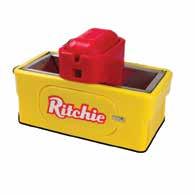
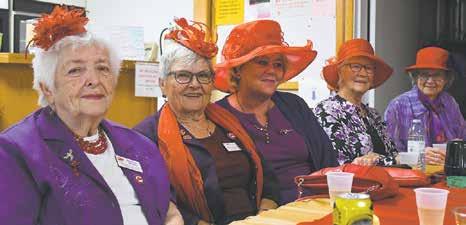
ies the spirit of the Red Hat Society.
Led by Queen Yvette Gardner and ViceQueen Twyla Wood, the group organizes various social events, including themed gatherings, trolley tours, and progressive suppers. These activities provide opportunities for members to connect, laugh, and enjoy each other’s company. For instance, in August 2021, the High Steppers hosted a day filled with games, a barbecue, and a humorous “Ford convertible” prize, featuring a mobility scooter adorned with a homemade “Ford” sign.
The High Steppers also play a significant role in the broader Red Hat com-
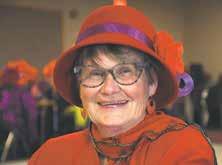
munity. In May 2022, the chapter hosted a provincial convention at the Heritage Inn, attracting nearly 200 members from across Western Canada. The event featured a 1920s-themed reception, musical performances, and a regalia ball, showcasing the group’s commitment to creating memorable experiences.
Gardner, who has been part of the society for nearly two decades, emphasized the group’s commitment to celebrating life at every age and encouraging women to embrace their individuality.
“We’re just getting together, having fun, and socializing. That’s what we do: all the good things, (along with some)
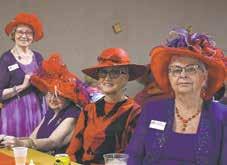
good food. We’re (even) eating our dessert first today,” she said with a laugh.
The afternoon’s entertainment included a performance by a Marilyn Monroe impersonator from Regina, adding a touch of glamour to the festivities. Attendees also enjoyed browsing items from three local vendors and participating in door prize draws.
Gardner spoke about the society’s inclusive nature and its role in fostering connections among women.
“We (welcome) anybody in the group. It’s all about helping ladies; we have some ladies who don’t get out much at all, so somebody picks them up and they’re always happy to get out,” she noted.
Looking ahead, the High Steppers plan to host another event at the end of the month and are eyeing an international gathering in Australia in two years’ time. “That’s exciting,” Gardner said, adding that she plans to attend along with a close friend from the chapter.
For those interested in joining the Red Hat Society, Gardner encourages reaching out to any local chapter queen or contacting her directly at 306-6840738. For more information, visit RedHatSociety.com.


By Joyce Walter - For Moose Jaw Express
Hamburger or ground beef is the main ingredient in one of the popular recipes in the anniversary cookbook of the Saskatchewan 4-H.
Called by a variety of names, the recipes turn out a similar product — meat loaf.
Some of those recipes are featured in this week’s column.
•
hamburger bread crumbs
1 egg salt and pepper
1 onion, finely chopped
2 dill pickles
1 cup mushrooms
1 1/2-2 cups grated cheddar cheese
Topping:
1 can tomato paste
1 tbsp. brown sugar
4-6 shakes of worcestershire sauce
1/4 cup parsley
1/4 tsp. garlic powder
Mix hamburger with the bread crumbs, egg, salt and pepper.
Roll out the hamburger mixture between two sheets of parchment paper to approximately 8x12x1/4 inch thick. Remove top layer of parchment paper.
Finely chop the onion, mushrooms and dill pickles. Mix and lay across centre of the hamburger. Cover the mixture with the grated
cheese.
Fold up sides and seal off ends to form a roll. Remove parchment paper and place hamburger roll in a large bread pan.
Bake at 375 degrees F for about 1 1/2 hours. Pour off excess fat during the baking time.
Mix the topping ingredients together in a small bowl and spread over the top of the meatloaf for the last 20-30 minutes of cooking.
•
1 1/2 lbs. ground beef
3/4 cup rolled oats
2 eggs, beaten
1/4 cup chopped onion
1 tsp. salt
1/4 tsp. pepper
1 tbsp. snipped parsley, optional
1/2 tsp. savoury or thyme, optional
1 cup tomato juice
2 tsps. brown sugar
1/2 cup ketchup or
1/4 cup ketchup and 1/4 cup barbecue sauce
2 tsps. prepared mustard or 1/4 tsp. dry mustard
Combine all ingredients except the ketchup, mustard and brown sugar and pat firmly into a large loaf pan.
Combine ketchup, mustard and brown sugar and pour over the meat mixture.
Bake at 350 degrees F until cooked, about 40 minutes. Cool for five minutes before slicing.
1 egg, beaten
1/2 cup tomato juice
3/4 cup bread crumbs
1/2 tsp. oregano
1/4 tsp. salt
1 clove garlic, minced
1/4 tsp. pepper
1 1/2 lbs. ground beef
6-8 thin slices ham
1 pkg. sliced mozzarella cheese
Combine egg, tomato juice and stir in crumbs and seasonings. Add to ground beef and mix well.
On parchment paper, pat meat into a rectangle. Arrange ham slices on top of meat and then cheese slices on top of ham. Reserve one slice of cheese.
Starting at one end, roll meat, seal edges and ends.
Place roll, seam side down, on a cookie sheet. Bake at 350 degrees F for 1 1/4 hours. Remove parchment paper. Melt slice of cheese over top of exposed meat. When slicing, the loaf may be slightly pink because of the ham.
Note: if desired, eliminate the parchment paper and simply cook in a large loaf pan. Drain off fat. Or use foil and roll up meat inside then cook on cookie sheet.
Joyce Walter can be reached at ronjoy@saasktel.net
The Saskatchewan Human Rights Commission (SHRC) is holding a meeting to give residents the chance to learn about their rights and have meaningful conversations about the future of human rights in the province.
The “Human Rights Education and Engagement Evening” takes place on Tuesday, May 20 from 6:30 to 8:30 p.m. in the Moose Jaw Public Library’s south meeting room. Admission is free, registration is not required and the meeting is open to everyone.
“Whether you’re an employer, employee, service provider, customer, or community member, this is a valuable
By MooseJawToday.com staff
opportunity to learn how human rights protections work and how they impact everyday life,” said Robin Mowat, director of systemic initiatives at the Saskatchewan Human Rights Commission.
“It’s also a chance for the people of Moose Jaw to shape the Commission’s work. We want to hear directly from the community about the human rights issues that matter most, the challenges they face, and their ideas for building a stronger, more inclusive Saskatchewan.”
According to the Commission, systemic initiatives are systems that, sometimes by design or sometimes unintentionally, create barriers or disadvantages.
The organization has successfully addressed inequity and inequality that affect individuals and groups, whether students with reading disabilities, university students, people who are deaf or hard of hearing, and those affected by lack of transportation or poor housing quality.
“A systemic approach addresses discrimination that is known to, or has the potential to, affect groups of people based on protected grounds,” the Commission said.
Also, when the organization considers using a systemic approach to address an issue, it does so in agreement with the Saskatchewan Human Rights Code.
Therefore, it noted that this process should pertain to current law, policy or practice that systemically infringes upon human rights protected under the Code.
As part of a broader initiative, the Commission will visit communities across the province throughout 2025 to engage with the public and strengthen human rights protections in Saskatchewan. These visits ensure that voices from across the province are heard and reflected in the Commission’s work moving forward.
If anyone requires accommodation to attend, contact the Commission at contact@saskhrc.ca.
The Moose Jaw & District Chamber of Commerce is inviting nominations for its board of directors, providing a unique opportunity for local business leaders to take an active role in shaping the region’s economic future.
Nominations are now open for seven positions on the board, with elected directors serving a two-year term from September 2025 to September 2027. The deadline to submit nominations is 5 p.m. on Monday, June 9.
The Chamber is encouraging its members to nominate candidates who are committed to supporting local businesses and economic development in Moose Jaw. According to the official call for nominations, individuals who are passionate about community engagement and collaboration are ide-
Aaron Walker - Moose Jaw Express
al candidates for this leadership role.
Of the current directors, four — Kyle Favel, Devonne Lalonde, Melissa MacLean, and Yeng Ling — have terms expiring this year and are eligible for re-nomination.
If more than seven people are nominated, the Chamber will hold an election. If an election is to be held, voting will take place through a secure online platform with each member in good standing able to cast one vote.
The board of directors is composed of 16 elected and three appointed members. Together, they are responsible for mobilizing community resources to achieve the Chamber’s objectives and foster a thriving local business environment.
Board members are expected to

attend at least 75 per cent of the 10 annual Chamber of Commerce meetings and to participate in at least one Chamber or special event committee. With a time commitment of just one
to three hours per month, the position offers a chance to contribute to initiatives that affect the broader business community.
Candidates must complete a nomination form, which includes submitting a short biography of 200 words or less, and confirm their willingness to fulfil the responsibilities of the role if elected. The nomination form must be signed by the candidate and submitted to the Chamber office at 88 Saskatchewan Street East or via email to Heather@MJChamber.com.
The new board members will be officially installed at the Chamber’s annual general meeting in September.
For more information or to access the nomination form, call 306-6926414 or visit MJChamber.com.

‘Flat Bishop’ brings Moose Jaw and Vancouver together on pocket-sized adventure
Aaron Walker - Moose Jaw Express
As part of a school project, a Grade 2 student from Vancouver, B.C., helped bring an adventure-bound paper cutout figure to life — and in the process, inspired a city two provinces over.
Earlier this year, Moose Jaw’s Mayor James Murdock received an unexpected letter in the mail: a message from an eight-year-old boy named Bishop and with it, a paper cutout dubbed “Flat Bishop,” inspired by the beloved children’s book character Flat Stanley.
“His letter was made to my attention as ‘Dear Mayor Murdock,’ and he introduced himself and familiarized me with the story of Flat Stanley,” Murdock said. “He was basically introducing me to Flat Bishop — a spin-off of his own name — and asked if I could take him on some adventures.”
Over the course of two months, the mayor and Flat Bishop did just that.
From visiting City Hall and joining council chamber tours, to cheering at local swim meets and even attending a Chamber of Commerce pancake breakfast, Flat Bishop made the most of his

where he was in my pocket — I’d forget he was there! But we tried our best, and I think we completed the mission.”
Perhaps most touching was Flat Bishop’s visit to a young local entrepreneur, Sydney Eberle, who crafts body scrubs with her grandmother to raise funds for charity. The paper companion also tagged along to an Optimist Club conference, Special Olympics events, and the 2025 BKT Tires Men’s World Curling Championship held in the city.
On his two-dimensional journey through a three-dimensional city, Flat Bishop served as more than just a curious guest — he became a bridge between communities and generations.
package for the student, complete with local souvenirs including a retro Moose Jaw T-shirt, Saskatchewan flag stickers, and a personalized note reflecting on Flat Bishop’s time in the city.
“I just hope he enjoyed his time in Moose Jaw,” Murdock said. “We felt fortunate and blessed to have him be part of the city. He’s more than welcome to return — we’d make sure he could go on more adventures.”
Though Murdock has yet to hear back from Bishop or his teacher, he’s optimistic a reply will come before the end of the school year — and it’s an experience he won’t soon forget.
time in the Notorious City. He posed for photos with Mac the Moose, stopped by the famous Mae Wilson Theatre, and even helped buy a vintage “Moose Jaw: The Friendly City” hat.
“Flat Bishop even toured our family farm and went on walks with our wirehaired fox terrier,” Murdock said with a laugh. “There were a lot of outings
“I think that anything we can do to engage youth and help them understand what it means to be part of a community is so valuable,” Murdock said. “For some of them, they will be our future leaders. A simple introduction with a civic leader might just spark that interest — and that spark could continue.”
As a gesture of thanks, Murdock and his daughters prepared a return
“You know, it was just really a feel-good story,” he said. “People in the community loved it once they heard the backstory. It made them smile.”
As for the biggest takeaway from Flat Bishop’s visit?
“We need more of these stories,” Murdock said. “(We need) more feelgood moments. They help us all reconnect, and they remind us of what it means to be part of something bigger.”
Residents are invited to show their support for mental health initiatives by participating in Nutters Everyday Naturals’ second annual “Round Up for Mental Health” campaign.
Throughout the month of May, Nutters is encouraging customers to round up their purchases to the nearest dollar when shopping at the store, with all proceeds benefiting the Canadian Mental Health Association (CMHA) branch serving Moose Jaw.
In just the first week of the campaign, Nutters locations across Western Canada have collectively raised over $10,170, with some stores collecting nearly $1,000 each. The Moose Jaw location has seen enthusiastic participation, reflecting the community’s commitment to mental health support.
“It’s about raising awareness and showing people they’re not alone,” said Nutters regional manager Elizabeth Hel-
lebrand. “In just one week, over $10,170 was donated to the campaign — it’s simply amazing.”
Last year’s inaugural campaign saw more than 10,500 customers contribute, raising more than $23,000 across 25 Nutters locations. With 27 stores participating this year, the company aims to surpass $40,000 in donations by the end of May.
Nutters Everyday Naturals, founded in 1982, is a health food retailer specializing in natural and organic products.
The company’s commitment to community well-being is demonstrated in initiatives like the Round Up for Mental Health campaign.
Funds raised through the campaign directly support local CMHA programs, including suicide prevention training and recovery-focused courses.
The CMHA’s Moose Jaw branch has introduced several initiatives to sup-

port mental wellness — with many made possible through community donations from campaigns like Nutters’ Round Up for Mental Health. One example is the “Let’s Thrive in 2025” day planner, de-
signed by a client in CMHA’s vocational program and filled with mental health resources and mood tracking tools, with proceeds supporting local services.
CMHA Moose Jaw also offers peer support groups, mental wellness education, and creative therapy programs such as writing workshops. Donations from the campaign help ensure these vital services remain available and accessible to those in need within the community.
Nutters Moose Jaw encourages customers to participate by simply saying “yes” at the till. Every small contribution adds up to make a significant impact on local mental health services.
For more information on Nutters and the Round Up for Mental Health campaign, visit Nutters.com.
Nutters Moose Jaw is located at 605 Main Street North and can be reached at 306-694-0111 during regular business hours.
While the Moose Jaw Band and Choral Festival is best known for its public performances, a significant part of the event takes place behind the scenes — in the form of one-on-one instruction and feedback from clinicians.
One of this year’s adjudicators, Gareth Jones of the University of Calgary, emphasized the essence behind each performance that these judges are looking for: “As musicians, first and foremost, it’s about creating a beautiful sound and communicating emotions to the audience,” he said. “We also look at how the students listen to each other and play together as a group. That’s a big part of what we’re listening for.”
Jones, who spent over 20 years with the Calgary Philharmonic before switching to teaching, said the festival provides a rare and valuable moment for students to focus exclusively on music.
“During a typical school day, they’re pulled in 27 different directions,” he said. “Here, they get to travel together, perform in a new setting, and just really focus on making music. The experience is huge.”
Aaron Walker - Moose Jaw Express

Veteran music educator Nadine Ghiglione of Regina offers feedback to the École River Heights Grade 8 Band, directed by Sarah Brolley of Winnipeg, Man., during their 10:30 a.m. session at the Mae Wilson Theatre on May 15. Ghiglione, a longtime teacher and respected clinician, served as one of this year’s concert band adjudicators. Photo by:
Each ensemble received a full hour on stage — 30 minutes to perform, and 30 minutes for a clinic with feedback and demonstrations. Some clinicians even brought their own instruments to better connect with students. “Sometimes playing is a little clearer than
words,” said festival chair Janie Fries. “It’s about getting kids to play better and to understand how to do that.”
Darieus Brass, a student in the Grade 5-6 band visiting from Sturgis, Sask., was one of those students who received feedback. His group was adju-

dicated by Brent Pittman, a retired music instructor who spent 37 years teaching in the Arcola and Saskatoon Public School Divisions.
“We got to learn about our technique, to have patience, and how to play better,” Brass said.
Importantly, the festival has adopted a non-competitive model, one that Jones fully supports.
“The Moose Jaw festival has been non-competitive for many years. And now, more and more festivals are going that direction,” he said. “It’s all about growth; when you take away the pressure of grades, kids open up to the learning process.”
The hope, according to Jones, is that students leave the festival feeling inspired to continue with their musical journeys through high school, post-secondary, and maybe even professionally. “Music can be a lifelong thing,” he said.
To learn more about the Band and Choral Festival, including short biographies on each of this year’s clinicians, visit MJBandAndChoral.org.

Saskatchewan Polytechnic proudly thanks Westridge Construction Ltd. for their generous $840,000 contribution to the Time to Rise campaign and the new Joseph A. Remai Saskatoon Campus.
For their generous support each carpentry shop on our campuses will be renamed the Westridge Construction Ltd. Carpentry Workshop. It also provides $90,000 in student awards—helping future carpenters overcome financial barriers and focus on mastering their craft.
Thank you, Westridge Construction Ltd. for investing in students, industry and the future of Saskatchewan. As we raise $100M, we are grateful for your commitment to Saskatchewan, and your support as Saskatchewan Polytechnic continues to develop the next generation of leaders, thinkers and innovators who will push the boundaries of what’s possible.

By Joyce Walter - for Moose Jaw Express
With the hills starting to turn green, many crops in the fields, leaves on the trees, flowers in the beds and a bright blue sky overhead, it can’t be anything but the start of another beautiful and educational tourist season.
In fact Saskatchewan Tourism Week is just around the corner, running from May 26-May 30, an annual kick off to what tourist operators hope will be a banner year as far as visitor numbers and economic values are concerned.
It is a given that tourist folks also hope the excitement of this opening of the official tourist season will continue to build and grow through June to the Labour Day weekend, and then beyond into the “shoulder season,” the time of year when most attractions are closed but senior travellers like to hit the road looking for scenic spots and event-related activities.
Years and years ago we didn’t think of ourselves as tourists when we took a summer vacation. We were simply “on holidays,” pitching a tent in an unserviced campground or visiting the relatives until the welcome became worn and ran out.
Sometimes the summer vacation was merely a trip to a bigger city
where we might visit a museum or eat in a restaurant rather than packing our own lunch to eat at a roadside turnout — where there was a communal bathroom in a shack.
Gradually it dawned on someone with some savvy and marketing skills that vacationers should be acknowledged as tourists, worthy of the open arms of welcome and friendship in the places they stopped.
Those same smart and crafty individuals also realized the truth in “build it and they will come” and encouraged development of various attractions that would entice visitors to stop and maybe stay a day or two to explore other opportunities in the same or nearby communities. Tourist groups were formed and operated individually, then were merged into government agencies, then thrown back into the pile to become membership-driven with some hand-holding and encouragement from Big Brother and Big Sister.
Now tourism is big business and figures from 10 years ago show that Saskatchewan attracts more than 13.6 million visitors annually, put $2.37 billion into the economy in 2017 and provided jobs for 67,000 employees. Not
a bad growth from a tent in a lakeside campground to what tourists are offered today.
We in our household have had many experiences as tourists in North America. We can be identified as tourists by the camera around Housemate’s neck, the speed at which we make our way through unfamiliar communities looking at the sights and by the awe and appreciation with which we look at what is offered for visitors at our various stops.
We do our research before we venture out but there is nothing to beat person-to-person conversations with tourist officials or ordinary citizens who realize we’re from away and are proud to tell us where to go and how to get there.
Housemate suggests getting lost is the best way to see the unexpected, so we’ve been unexpectedly and happily surprised on more occasions than we should admit.
His holiday happiness is photographing wildlife and old buildings plus browsing through collections at small town and big city museums. And finding homemade pie to enjoy.
My vacation delights are clean motel rooms, full-service gas stations with attendants who wash all the car windows

and lift the windshield wipers, decent signage on strange roads, and regional cuisine not readily available at home.
We hope tourist leaders in small communities make sure that attraction operators understand that tourists do not operate on a 9-5 schedule. That means would-be tourist attractions should align their hours to accommodate the visitors.
Closing the doors of museums and eating establishments on Saturday and Sunday makes little sense in the longterm viability of tourism outlets.
Outdated advertisements should be cancelled or killed on whatever platforms are being used.
And don’t forget to train staff in the basics: the location of the washrooms, and where the rodeo grounds might be located in the community.
Surprisingly, the people at home are sometimes the worst ambassadors for their own communities. A zippy tourism group engaged with the community might change some of that lacklustre treatment of tourism visitors.
Tourists: start your engines and begin your travels. There is much to see and do.
Joyce Walter can be reached at ronjoy@ sasktel.net
March 4, 2025
1st – Walter Hawkins & Eunice Reader
2nd – Bob Cobbe & Vivian Brailean
3rd – Ronald & Linda McGinnis
Hidden Score – Lawrence Fatteicher & Frank Van
Breugel
March 11, 2025
1st – Bryce Warren & Jeff Walpole
2nd – Ken & Yvette Storozuk
3rd – Ron & Linda McGinnis
Hidden Score – Judith Deatrich & Judy Bender
March 18, 2025
1st – Debbie Firthy & Linda Sempel
2nd – Ken & Yvette Storozuk
3rd – Anita Duncan & Laurie Albinet
Hidden Score – Walter Hawkins & Myrna Hawkins
March 25, 2025
1st – Bryce Warren & Jeff Walpole
2nd – Lawrence Fatteicher & Frank Van Breugel
3rd – Diane Bruck & Yvette Storozuk
Hidden Score – Bob Cobbe & Vivian Brailean
April 1, 2025
1st Ronald & Linda McGinnis
2nd Bryce Warren & Jeff Walpole
3rd – Vivian Brailean & Bob Cobbe
Hidden Score – Marie Spencer & Sharon Knittel
April 8, 2025
1st – Judith Deatrich & Judy Bender
2nd – Anita Duncan & Rae Trites
3rd – Diane Bruck & Yvette Storozuk
Hidden Score – Marie Spencer & Sharon Knittel
April 15, 2025
1st – Yvette Storozuk & Diane Bruck
2nd – Marie Spencer & Sharon Knittel
3rd – Bryce Warren & Jeff Walpole
Hidden Score –Myrna Hawkins & Eunice Reader
April 22, 2025
1st – Ronald & Linda McGinnis
2nd – Bryce Warren & Jeff Walpole
3rd – Vivian Brailean & Bob Cobbe
Hidden Score – Marie Spencer & Sharon Knittel
April 29, 2025
1st – Marie Spencer & Sharon Knittel
2nd – Lawrence Fatteicher & Frank Van Breugel
3rd – Ann Kraus & Lorne Jackson
Hidden Score – Judith Deatrich & Bob Busse




Opa! Moose Jaw’s fourth annual Greek Night was hailed as the best yet by organizers, as the community came together for an evening of food, music, dancing —along with the Greek traditional smashing dinnerware.
Held on May 10 at the Temple Gardens Centre, the popular fundraiser was organized by Tourism Moose Jaw (TMJ) and the Downtown Moose Jaw Association (DMJA). The event drew hundreds of guests, nearly selling out as people gathered to celebrate Greek culture while supporting local initiatives.
“I thought it was a lot of fun,” said Donna Fritzke, executive director of Tourism Moose Jaw. “We’ve had a lot of comments that this was the best year yet, and the food was absolutely amazing. People were dancing, singing, and winning prizes — it was just a lot of fun.”
The evening featured a full-course gourmet Greek meal prepared by staff at the Temple Gardens Centre, traditional dancing, and live music by Greek band Arkadia. Guests enjoyed Greek-inspired cocktails and a performance by Won-

Aaron

derland, dubbed “Saskatchewan’s party band.”
One standout moment was the plate-smashing ceremony — a first for many in attendance, including Fritzke herself.
“The plate smashing was very cool,” she said. “I’ve never experienced that before, and (everyone I spoke with said they were) having a lot of fun.”
To make it happen, Fritzke personally crafted over 300 plaster plates in the weeks leading up to the event.
Although the final fundraising total has yet to be confirmed, previous Greek Night events have collectively raised around $90,000. This year’s proceeds will once again be divided between TMJ and the DMJA to support various proj ects within the community.
Moose Jaw’s downtown has already benefited from past Greek Night events, with initiatives including new Christmas light displays and other beautification efforts.
Community support has been cen
tral to the event’s success. Fritzke emphasized that this generosity continues to make the fundraising event possible.
“Moose Jaw is such an amazing community and is just so generous with their time and support,” she said. “So many people came out to support (TMJ) and the (DMJA). It was really incredible.”
The evening also featured a familiar local twist on a classic fundraising game. Instead of “heads or tails,” guests
a nod to the city’s beloved mascot, Mac the Moose. For many, the packed dance floor was a sign of a night well spent.
Greek Night 2025 was presented by the Moose Jaw Funeral Home and made possible thanks to the generosity of several local sponsors, including the Moose Jaw Express and SaskPromo.com.
Tourism Moose Jaw is located at 450 Diefenbaker Drive and can be reached at 306-693-8097. For more information visit TourismMooseJaw.com or “Tourism Moose Jaw” on Facebook.
To learn more about the DMJA, visit DowntownMooseJaw.ca.

Surrounded by Greek dancers, a guest tosses a plaster plate as part of the night’s

City hall has been operating on reduced hours since the pandemic occurred in March 2020, but one city councillor wants to expand the building’s hours so residents have more time to conduct business.
During the recent regular city council meeting, Coun. Carla Delaurier submitted a notice of motion requesting that city hall resume in-person public business hours from 8:15 a.m. to 5 p.m., Monday to Friday aside from statutory holidays, with this change going into effect Wednesday, July 2.
Also, since the commissionaires provide security, she moved that the source of funding to cover these extra costs come from vacancies and procurement savings of $17,500.
Council will discuss this notice of motion during its next regular meeting on Monday, May 26.
City hall’s hours were from 8:15 a.m. to 5 p.m., Monday to Friday before the pandemic, but changed during the crisis, and in May 2021, the city said in
a news release that the building’s hours would permanently remain from 10 a.m. to 4 p.m.
Past requests
Council has received requests from residents since then for city hall to revert to its pre-pandemic hours, including Carolyn Ross with the Good Neighbours Group (GNG), who spoke to council in May 2024.
Moose Jaw is the fourth largest municipality in Saskatchewan and has the fewest number of accessible hours at any city hall, she said. Furthermore, out of 53 cities, towns and villages that the GNG researched, The Friendly City has the fewest hours accessible to the public, second only to Morse, which has a population of 240.
“Every city hall and municipal office has returned to regular business hours, with the exception of Moose Jaw,” Ross added.
Fewer residents attending
During that same meeting, thenCoun. Kim Robinson asked why city
Jason G. Antonio - MooseJawToday.com
hall hadn’t returned to regular hours, with city manager Maryse Carmichael pointing back to the news release.
She extrapolated by saying onethird fewer residents were coming to city hall for business than before, likely because more people were going online to pay parking tickets or access the services they needed. She also noted that city hall is open over lunchtime, while many small businesses aren’t, so it is meeting citizens’ needs.
Asked whether there was a significant cost to extending hours, Carmichael said it’s important for city employees to be as productive and efficient as possible throughout the day.
“The customer service reps we have downstairs use the first hour and fortyfive minutes before city hall’s doors are open to do some of the work — either cash in or cash out — and also to do some of the work from online transactions we see overnight,” she said, adding employees spend the last hour of the day finishing tasks.
Carmichael then provided a more detailed report during the June 10, 2024, regular meeting about why the current hours were appropriate.
Before the pandemic occurred, administration began modernizing how it assisted residents and businesses intending to provide efficient, accessible and convenient services, she said. The pandemic accelerated those changes, as the city offered more online access to services, gave staff greater remote work capabilities and reduced in-person public access.
Carmichael noted that there are several advantages to offering services online, including convenience, cost efficiency, the ability to reach larger audiences, accessibility, speed, flexibility and data management.
If city hall extended its hours to 8:15 a.m. to 5 p.m., the cost to have commissionaires would be $1,495 monthly or $17,943 annually, while extending hours to 9 a.m. to 4:30 p.m. would cost $822 and $9,869, respectively, she added.
Canada’s national anthem is usually played at the start of athletic events and sometimes at meetings, but its patriotic words will soon ring out inside city council chambers.
During council’s recent regular meeting, Coun. Carla Delaurier introduced a motion that O Canada be played at the start of every meeting beginning on Monday, June 9.
“As a municipal government, our Canadian identity and pride can be further expressed by the respectful observation of our national anthem preceding our land acknowledgement at regular meetings,” she said. “Both practices reflect the unity we share as Canadians who value our heritage.”
The national anthem is a longstanding tradition that people observe in schools, at hockey games and during some community meetings, she continued. Moreover, the time it takes to sing the song is under two minutes.
“… in light of our country’s renewed and growing patriotism, I respectfully
Jason G. Antonio - MooseJawToday.com
bring this motion forward,” Delaurier said.
She indicated that she would not judge any of her colleagues who opposed the motion, while she hoped residents respected those members who disagreed with the idea.
“It’s not a matter of having or not having civic pride in this building (because) it’s (already) here,” Delaurier added. “This is just one more way to share that amongst ourselves and to the public.”
Coun. Heather Eby said that while she’s patriotic, loves her country and flies the Canadian flag in her front yard, she was opposed to the motion. She acknowledged that the anthem is performed at hockey games and in some schools, but didn’t know of it being played in other business meetings.
Continuing, she pointed out that several years ago, an invocation kicked off every council meeting with the city clerk reciting a statement. However, council eventually eliminated that since it believed the chambers were a place of
business and there was no place for such a statement.
“I get that pride thing, I get the patriotic thing, I get all that,” Eby said. “I just don’t know … this is really hard. I just feel like we’re cornered if we vote against (this and we’d) be lambasted. I don’t think it is necessary in a business meeting.”
Coun. Dawn Luhning said she’s had a Canadian flag hanging outside her home for two months but agreed with Eby’s comments. She pointed out that the Canadian flag, the Saskatchewan flag and the city’s flag stood behind the group, which should be enough.
Coun. Chris Warren asked city administration how it would handle this logistically and whether it would be an issue, with city manager Maryse Carmichael saying the city clerk could play the song over the speakers and it would not be a problem.
City clerk Tracy Wittke confirmed that was true, making that municipality the only one out of 16 cities in the province to do so.
Coun. Patrick Boyle had no issue with playing the national anthem since it took only 74 seconds to sing. Moreover, it “wasn’t out of the realm of what’s normal” since Saskatoon was already doing it, while playing the tune should happen in more places.
Coun. Jame Logan said he was indifferent but noted that if one person became more patriotic after listening to the anthem in council chambers, then the song had done its job.
“We’re all proud to be Canadian, otherwise we would not be sitting up here. We are proud to be from Moose Jaw and it shows that with the flags,” he added. “But what’s 74 more seconds?”
Council then voted 5-2 in favour of the motion, with Eby and Luhning opposed.
Mayor James Murdock said he had heard that Saskatoon plays the national anthem before its council meetings. He then asked administration to confirm the veracity of that.
THE NEXT REGULAR COUNCIL MEETING IS MONDAY, MAY 26
Major snowfalls earlier this year forced city hall to spend more time hauling away the powdery precipitation and blow through almost 80 per cent of its snow operations budget.
City administration presented the first-quarter financial report during city council’s May 12 regular meeting, with data showing revenues and expenses from Jan. 1 to March 31.
While discussing the document, finance director Brian Acker pointed out that the public works division’s expenses were 34 per cent higher for Q1 compared to the expected level of 27 per cent.
Specifically, of the $5,904,290 budgeted for this year, public works spent $1,995,973 compared to the expected $1,608,258.
The finance report noted that an overage in snow operations was one reason for the increase, as the city budgeted $1,596,259 for the year and spent $1,236,691 in the first quarter instead of the expected $827,233, using 77 per cent of the budgeted amount.
“As you will recall, we had some significant snow events in the first quarter, and as well, we did a significant amount of work around clearing snow and getting ready for the potential spring flooding,” said Acker. “So that’s caused that (line item) to be up significantly.”
The second reason the public works division’s expenses were higher is because repairs to the fleet vehicles were $246,000 over budget, he continued. This has become “an ongoing theme over the past few years,” because as the
Jason G. Antonio - MooseJawToday.com
fleet grows older, the city faces significant increases in maintenance costs.
The city uses its equipment regularly and has related operating expenses and equipment reserve revenue contributions to make, Acker added. When expenses with the former exceed the latter’s revenues, that results in a loss.
Bevan Harlton, director of operations, said the city contributes money to each unit for repair and maintenance, but when those machines experience “catastrophic or unexpected” repairs, those costs become unfunded through the current funding model.
“So … we have five units that had, between hydraulic systems and transmission systems, significant failures (and) significant issues,” he remarked, noting that the city usually exceeds the
amount in the equipment reserve making these unexpected repairs.
Meanwhile, the public works division faces a gap with commissioning new equipment, which was less of a problem in the first quarter but “more prevalent” last year, Harlton added. This means it takes time to make new machines usable since the supplier must ensure they’re road-worthy first.
City manager Maryse Carmichael said that while the public works division’s expenses are over budget, this report is just for the first quarter, while the city used its heavy machines frequently in February and March to prevent spring flooding. Therefore, staff had to repair machines more since they were used more.
City council has officially approved a zoning bylaw change that will allow the construction of more fourplex dwellings in certain zoning districts in the community.
During its May 12 regular meeting, council gave three unanimous readings to an amendment to zoning bylaw No. 5732.
This means homeowners or builders can now construct duplexes, triplexes, or fourplexes “as-of-right” within the R1, R1A and R1B districts as permitted uses, provided the property meets minimum lot size, parking, and development standards — without requiring a rezoning, discretionary use application, or public hearing.
These changes were necessary so Moose Jaw could qualify for funding through the federal government’s Canada Housing Infrastructure Fund (CHIF).
The municipality has applied for more than $44.1 million through the fund, including $26.5 million for the $66.5 million Crescent View Head-
Jason G. Antonio - MooseJawToday.com
works project, $5 million for the $10 million South Hill pumphouse initiative and $12.68 million for the $31.7 million cast iron water pipes and feeder main project.
On its website, city hall said that:
· This regulatory change does not mean existing single-family homes will be automatically demolished or replaced with multi-unit buildings
The change removes zoning barriers so more housing options can be created gradually, not overnight
· The city is not planning or leading any housing construction projects in these neighbourhoods
· Any new duplex, triplex, or fourplex development would be led by private owners or developers — only if they choose to invest and if it makes financial sense
Council first debated this change during its April 28 regular meeting, but after hearing from concerned citizens, tabled the matter until city hall further informed the public about what these changes meant.
During the May meeting, several council members discussed their thoughts about the amendment.
Coun. Jamey Logan said that while he was absent from the April meeting, he watched the video and listened to citizens’ concerns, which would inform how he voted on this motion.
Coun. Patrick Boyle said he was “very much torn” on supporting this because he disagreed with the bylaw “in principle and the reasons for it.”
However, he pointed out that the storm sewer system’s “infrastructure woes (were) adding up” and there is only one infrastructure-related federal program that is also wrapped up in a housingfocused program.
Continuing, Boyle said he “vehemently disagreed” with Ottawa’s approach of combining infrastructure and housing funding, which meant council had no option but to pass this bylaw.
“Until another suite of programs comes out, we are tied to this. That is the growing frustration people are having today with the federal government,”
Boyle added. “I think you’re seeing a lot of that conversation across Western Canada today.”
Resident Art King interrupted and asked why council wasn’t holding a public hearing since he wanted to comment. However, meeting chairwoman Coun. Heather Eby said the hearing happened in April and council had tabled the matter to now for further discussion.
Mayor James Murdock acknowledged that these were “tough decisions” since the federal government had essentially “handcuffed” council. However, this council had the task of “trying to make up for a lack of judgement over the decades” by other councils and their priorities.
Coun. Chris Warren pointed out that even with this change, the zoning bylaw’s requirements would not change and would still control development standards, such as height, size, setbacks and parking — the same for all other residential districts.
The Temple Gardens Centre experienced a first-quarter deficit of nearly $500,000, which was $322,000 more than expected and was mainly due to the venue not receiving revenue for events on time.
From Jan. 1 to March 31, the former Events Centre had actual revenues of $1,777,685 and actual expenses of $2,218,670, for an operating deficit of $440,985.
However, after including the management fee of $38,164 and the WHL Warriors’ building rentals revenue of $800, the net operating loss was $476,349. Overall, this represented a cost recovery rate of 78.77 per cent, leaving taxpayers to cover the remaining 21.23 per cent.
In comparison, building manager OVG360 had budgeted $1,936,571 in revenues and $2,054,167 in expenses for the quarter, leaving an expected
operating loss of $117,596. Including the management fee of $39,181 would have led to an overall operating loss of $156,777.
Therefore, the differences between the actual and budgeted revenues, expenses and net income were -$158,886, -$164,503 and -$321,572.
Of note, there was $311,605 less in event revenue than expected, while the rink program generated $17,832 less in revenue than planned, the report said. Meanwhile, there was $103,911 more in event expenses than budgeted, along with $53,779 more in overhead expenses than budgeted.
The Q1 numbers were based on 62 events over 67 days and a total paid general attendance of 47,127 people.
City administration presented the first-quarter financial report during the May 12 regular city council meeting.
The Resort Village of North Grove is offering for sale by public tender the following lands:
Lot 13 Blk/Par 3 Plan 60MJ08944
Lot 17 Blk/Par 2 Plan 60MJ08944
Lot 18 Blk/Par 2 Plan 60MJ08944
Tender Packages include instructions to bidders with property information and bid form. The Packages can be picked up at the Resort Village of North Grove office at #5-1410 Caribou St. W, Moose Jaw, Monday to Thursday 9 a.m. to 12 p.m. and 1 p.m. to 4 p.m. Please call the office with any questions at 306-694-8300.
Deadline for receipt is Thursday June 5, 2025 at 4:00 p.m.
The Village will consider tenders at the June 9, 2025 Council meeting.
Tenders need to be submitted separately for each property and marked "Property Tender with the address of the property you are submitting a tender for, as well as the completed Tender Bid Form and required deposit.
The Village reserves the right to reject any or all bids received.
Jason G. Antonio - MooseJawToday.com
Financial information about the Temple Gardens Centre/Multiplex was included in the document.
Council later unanimously voted to receive and file the report.
Coun. Jamey Logan pointed out that there was “a very substantial difference” between the budgeted amounts and the actuals for Q1. He wondered why the TGC had experienced such issues and didn’t budget for those swings.
Shaunna Fritzler, general manager, said these differences related to the timing of when the venue received revenues and expenses. For example, it was forced to complete two unexpected repairs in Q1, while two large unbudgeted expenses came through.
Furthermore, the TGC faced timing issues with ticket sales for the international curling tournament and the upcoming concerts of Mark Chestnutt and
Shania Twain, as the venue recognized the expense side of these purchased tickets in March, she continued. Meanwhile, the organization saw revenues for the curling tickets in April — the start of Q2 — and it will see revenue for the concerts in June and July, Fritzler added.
Food and beverage sales
From Jan. 1 to March 31, OVG360 generated $549,606 in total catering and concession sales, while the total cost of goods was $211,801. This led to a total gross sales profit of $337,805. After removing total payroll, total variable expenses, management incentives and management fee, the net profit was $146,284.
These numbers were based on 62 events and paid attendance of 47,127 people.
Jason G. Antonio - MooseJawToday.com
City hall estimates that it will cost $16 million to replace infrastructure within the Spring Creek system, so it’s hoping a federal grant can cover three-quarters of that cost.
During its May 12 regular meeting, city council voted unanimously to authorize city administration’s application to the Canada Housing Infrastructure Fund’s (CHIF) provincial funding stream for the Spring Creek stormwater management project.
The projected capital cost is $16,063,250, with CHIF’s provincial stream potential providing $11,726,173 — or 73 per cent — leaving the municipality to provide $4,337,078.
The city must apply by Tuesday, May 20, while CHIF will award the money by late June.
The project focuses on the original Spring Creek alignment (OSCA), a critical stormwater management system that spans 2.2 kilo-
metres from the Spring Creek diversion dike to the Moose Jaw River, a council report said.
The OSCA includes channels, culverts and stormwater pipes that manage water flow through the city, while the project involves planning and capital works projects between 2026 and 2032.
The report pointed out that improving this infrastructure would reduce the risk of flooding and protect homes and businesses, while better stormwater management can lead to cleaner waterways and healthier ecosystems.
“Modernizing infrastructure will ensure the stormwater system can handle future demands, providing reliable service as Moose Jaw grows,” the document said, noting that contractor ISL finished part 2 of its evaluation of the Spring Creek project last year and provided recommendations for enhancements, which will guide the application process.
The CHIF program’s goal is to accelerate the construction and upgrading of housing-related infrastructure, such as drinking water, wastewater, stormwater and solid waste, the report continued. This application supports the creation of new homes and increases densification.
For CHIF’s provincial stream to consider the application, the city must meet the same housing requirement as the federal stream, specifically, the municipality must adopt zoning changes to allow the construction of four-unit dwellings “as of right,” the document said.
Administration added that it could meet other requirements that Ottawa wants, including not starting construction until environmental assessments or consultations with Aboriginal People occur, completing the project before Oct. 31, 2033, and reporting on climate resilience and adaptation measures.
Taxpayers owed nearly $5 million in total tax arrears at the end of the first quarter, which was nearly 30-per-cent more than Q1 2024, while fewer people participated in payment plans.
City administration presented the first-quarter financial report during the May 12 regular city council meeting, which included data about tax arrears, outstanding debt and how much each property class owed.
Council voted unanimously to receive and file the report.
As of March 31, taxpayers owed $4,945,206 in total arrears, which included $3,854,753 in property tax liens and $1,090,453 in arrears payment plans, the report said.
Conversely, by March 31, 2024, those numbers were, respectively, $3,821,445, $1,802,608 and $2,018,837.
Therefore, the total outstanding amount of tax arrears increased by $1,123,761 — a jump of 29.4 per cent — from Q1 2024 to Q1 2025. This comprised a year-over-year increase in liens of $2,052,145 and a decrease in payment plans of $928,384.
Meanwhile, by March 31, 2023, taxpayers owed $2,998,855 in total arrears, including $1,838,213 in property tax liens and $1,160,642 in payment plans.
Jason G. Antonio - MooseJawToday.com
During the previous council meeting, administration presented a list of properties from 2022 that it’s pursuing through tax enforcement, while in the coming months, it will provide lists of properties from 2023 and 2024 that it also wants to pursue, he continued.
Most property owners are willing to join a payment plan, while the city will take only one or two properties after this process is completed, the finance director said.
City hall must apply to the Saskatchewan Mediation Board (SMB) if it wants to take a property, which prompts the board to discuss the issue with the person, Acker explained. The SMB’s focus is encouraging property owners to join payment plans instead of allowing a municipality to take the property.
City hall welcomes property owners participating in payment plans, but the repayment schedule must “be reasonable,” Acker added. It’s similar to a credit card that may take 26 years to pay off with minimum amounts, except the city won’t “entertain payment plans of that nature.”
Property taxes receivable consists of tax arrears and taxes owing. Tax arrears are overdue taxes, while current
taxes are due but have not fallen into arrears. Taxes fall into arrears in the next year following the levy of taxes.
The total outstanding property taxes receivable by March 31 was $4,945,206, which was comprised of all outstanding arrears.
In comparison, total property taxes receivable that were outstanding by the end of Q1 2024 were $3,821,445, followed by $2,998,855 in 2023, $2,859,803 in 2022 and $3,788,665 in 2021.
At the end of 2024, the four main property classes owed $1,504,370.10 in outstanding arrears, followed by $1,178,536.06 in 2023 and $1,171,846.25 in 2022, the report said. This means those classes owed $3,854,752.41 during the last three years, while including payment plans of $1,090,453.30 increased the total to $4,945,205.71.
The taxes missed in 2024, 2023 and 2022 were:
• Commercial and industrial: $548,457.09 / $439,477.59 / $244,209.84
• Multi-unit residential: $124,799.01 / $104,136.60 / $61,692.68
• Single-unit residential: $831,114 / $634,921.87 / $865,943.73
Compared to commercial/industrial, residential comprised roughly 49 per cent of outstanding arrears by property class, the report said.
Borrowing/debt
As of March 31, 2025, city hall was still repaying on six projects after borrowing money to finance them. The principal outstanding amount on each project was:
• Multiplex long-term loan: $10,143,000
• Waterworks capital long-term loan: $19,104,000
• High-service pumphouse: $6,651,000
• Buffalo Pound Water Treatment Corporation (BPWTC) loan term loan (Bank of Montreal): $9,272,640
• Buffalo Pound Water Treatment Corporation loan term loan (TD Bank): $13,672,285.12
• Buffalo Pound Water Treatment Corporation loan term loan (Royal Bank of Canada): $14,090,444.09
• These projects totalled $72,933,369.21, a decrease of $1,135,178.17 from the end of the fourth quarter. Meanwhile, the City of Moose Jaw’s debt limit is $95 million.
City hall has updated its advertising and sponsorship policy to communicate more clearly about monthly, yearly or multi-year terms for contracts and to ensure the document is kept updated.
City council accepted the updated policy during its May 12 regular meeting.
The policy provides a consistent approach to facilitate and support naming rights, advertising and sponsorship opportunities for city-owned and -controlled assets to help enhance financial sustainability at those venues, a council report said.
Council first approved the advertising and sponsorship policy in April
Jason G. Antonio - MooseJawToday.com
2019, while regular reviews and updates since then have ensured the document aligns with existing practices and objectives.
The community services department administers advertising and sponsorship for the city through naming rights and non-exclusive licence agreements with the WHL Moose Jaw Warriors and EMJ Marketing, the report said.
The program has grown since 2019 — it has generated $612,424 in net revenue since then — and required an update.
Some changes to the policy this year include:
• Replacing all references to the parks and recreation department with the new community services department
• Adding advertising arrangement definitions to address a monthly or annual term since both require one payment and don’t require a formal agreement
• Updated a definition to address multi-year terms
• Updated responsibilities for the community services director and city solicitor; the former is responsible for approving all monthly or annual advertising and sponsorship
arrangements that are within the limits of the bylaw, while the latter is responsible for ensuring all multiyear advertising, sponsorship and naming rights are executed legally
• Adding a procedure to address monthly or annual arrangements for sponsorship or advertising, including a description of the relationship and arrangement, term of the arrangement, the payment amount, the rights and benefits, a clause stating who is responsible for costs with the production, installation and maintenance of the advertising, insurance, and early termination clauses
Spending money to maintain gravel roadways is more important to city council than paying a Toronto-based consultant to determine whether the city’s transit service is ready for zeroemission vehicles.
City administration presented a report during the May 12 regular meeting urging council to approve a transit zero-emissions vehicle (ZEV) feasibility study for $190,600, with $152,480 coming from a federal Infrastructure Canada (IC) grant and $38,120 potentially coming from municipal coffers.
The municipal contribution would include $18,120 from the gravel roadways budget and $10,000 each from the transportation division’s consulting services and legal support lines. However, administration hoped the Federation of Canadian Municipalities (FCM) would cover this amount with a grant.
The consultant, the Canadian Urban Transit Research and Innovation Consortium in Toronto, would analyze the city’s transit fleet, route and infrastructure requirements and provide recommendations on the eventual phase-out
of diesel buses and implementation of zero-emission vehicles.
The catch with the federal grant is the consultant must complete the work by Dec. 31, so it must start the work this month.
E-buses’ uncertain future
Warren said that electric buses have an uncertain future, while it would cost Moose Jaw $1.6 million to $1.8 million to purchase just one vehicle. Moreover, it would have to upgrade its bus barn, install charging machines and factor in the vehicles’ additional weight on roads.
Continuing, he questioned whether this investment made sense for a small city like Moose Jaw, considering council already subsidized transit services heavily. He also preferred to “seek the will of the market” by tendering the study instead of giving it to the Toronto-based consortium.
Limited viability
This study would be the first step in a much larger process, although it could have a limited immediate effect on the city’s transit needs, said Coun. Carla Delaurier. Moreover, Moose Jaw might not
Jason G. Antonio - MooseJawToday.com
have the infrastructure or population to justify spending this money.
A push-pull situation
Bevan Harlton, director of operations, said cities across Canada face a “push-pull situation” since they are being forced into acquiring different technology for their bus fleets. Conversely, city hall is finding that suppliers are limiting and reducing saleable vehicles with “conventional engines.”
The operations department wants to see the results of this study and what third parties are saying about electric buses, although in-house mechanics say they are not the answer, Harlton added. Also, this study would complement the transportation master plan.
Chiming in, city manager Maryse Carmichael said she shared council’s concerns about whether e-buses are viable for Moose Jaw. However, she pointed out that “it’s pretty rare” for two organizations to fund 100 per cent of a project’s cost. Therefore, this was an opportunity to explore whether ZEV buses were “the right solution.”
Meanwhile, Harlton said remov-
ing money from the gravel roadways account — chosen because it’s not connected to capital projects — would lead to less gravel laid and fewer maintenance passes; there are 50 kilometres of rural-area connecting roads and 80 kilometres of in-city gravel lanes.
Lack of success
Coun. Patrick Boyle said Ottawa was intruding on municipal governments’ authority by forcing them to conduct studies to receive funding for other projects.
Start the ball rolling
Mayor James Murdock said it was likely that the city would qualify for the $38,120, while he pointed out that this report would “get the ball rolling.” Meanwhile, he stressed that the day would come when the city’s 30-foot diesel buses would be “completely out of circulation” and officials would be forced to purchase larger ones.
Ahead of the game
Coun. Heather Eby said council hired a grant writer to find external funding and that’s what the woman has done.
Using metal cleats or spikes, drones, remote-controlled equipment or foam dart guns within all city arenas is now prohibited, just some changes to the arena usage policy.
The community services department presented an updated policy during city council’s May 12 regular meeting, with council unanimously approving the document.
Council last updated the policy in November 2024, when it changed the dates of operation for the arena ice schedule. Meanwhile, council received an amended policy because city hall reviewed the document recently to update the season dates, scheduling and user responsibilities.
Some changes the department made to the policy included:
• Replacing all references to the parks and recreation department with the
community services department
• Including baseball and softball as activities allowed on the arena sport court floor between April and August
• If required for scheduling, planning or registration purposes, the department may now confirm special events or specific bookings earlier than June 1 at the user’s request
• User groups must now sign the venue rental agreement by Sept. 15, indicating the ice allocation they want for the season and the terms and conditions of building rentals
• In 2026, user groups will not be scheduled at the Kinsmen Arena on Good Friday, while they will be scheduled during Good Friday at Pla-Mor Palace, Truth and Reconciliation Day, Thanksgiving Day, Family Day and Victoria Day
• Groups can return spring ice with 15 days’ notice due to unknown playoff schedules
• Weekday rush ice times at the Kinsmen Arena will now end at 4:15 p.m. to allow for better scheduling and flood times
• The city is now recommending that all user groups wear a helmet on the ice
• Spitting is now prohibited in the dressing rooms and on the sport court, while users must wear clean shoes on the court
• Participants are now prohibited from entering the ice or sport court surface when the arena lights are off
• Several activities or items are now banned from the arenas, including the use of white hockey pucks, batting activities using unregulated balls, batting balls toward the roof
or lights, metal cleats or spikes on the sport court, painting any lines or markers on the sport court, using drones, remoted-controlled equipment or foam dart guns and hitting golf balls
• Alcohol and illegal drug use are now prohibited in lobbies and meeting rooms
Also, the Kinsmen Arena ice will start Sept. 8 and end on March 15, 2026, the Bert Hunt Arena ice will start on Sept. 26 and end on April 12, 2026, the Wally Boschuk Arena ice will start on Oct. 14 and end of April 12, 2026 and the Kinsmen Arena sport court will start April 1, 2026 and end on Aug. 14, 2026.
The report added that city hall expects to have a 65-per-cent cost recovery rate from the arenas.
THE NEXT REGULAR COUNCIL MEETING IS MONDAY, MAY 26
Groups that use the Yara Centre are now prohibited from applying tape or paint to the track or turf, as part of changes to the venue’s booking and usage policy.
The community services department presented an updated policy during city council’s May 12 regular meeting, with council unanimously approving the document.
There are more than a dozen changes that the parks, recreation and facilities advisory committee suggested to the policy, which council adopted in May 2024 and that the committee reviews annually to ensure it aligns with current usage patterns and booking demands, a council report said.
Some changes include:
• Replacing all references to the parks and recreation department with the new community services department
• Updating the summer rate to indicate that fees are in effect from June to August instead of July to August, which should increase rentals of the batting cage
• Updating the holiday section to include additional labour costs for statutory holidays when the Yara Centre

is open, specifically, for Truth and Reconciliation Day, Thanksgiving and Family Day
• User groups must now report any damages to the track, turf or lights immediately to the front desk staff or supervisor on duty
• Providing clarity to say that drill station setups for practising skills now fall under venue bookings
• User groups accessing the turf during another organization’s rental time will be charged for early access, which means all groups arriving early must sit on the bleachers outside the black netting
• Groups that bring in equipment, decorations and/or electronic equipment must obtain permission and the necessary permits for the location and use of the items
• Groups cannot use the city’s motorized vehicles, machinery or other equipment that requires a licence or permit to operate
• Groups will be charged extra if employees have to assist with set up and tear down, including with curtains and nets, while overtime charges will apply if the assistance
Jason
is outside regular hours
• The supervisor must approve early access for groups that need to enter the building sooner than planned, while they will be charged for the additional time
• Applying tape or paint to the turf or track is prohibited
• For groups or users that fail to leave the building, the supervisor or manager will be contacted and will fill out a client behavioural incident report, which will determine if the group or user can re-book in the future
• While birthday party bookings are non-refundable, groups can reschedule them due to illness as per the recreation program and membership refund policy
Lastly, the updated policy now includes the current rates and fees for using the building for the 2025-26 year. The report noted that there are no additional costs for applying the proposed changes since adding June to the summer rates may increase rental revenue.
Meanwhile, demand for turf rentals remains strong in the winter, especially


among outdoor field and diamond sports training during those cold months, the document added. Also, lacrosse use at the Yara Centre increased during the 2024-25 season while soccer use declined.
During the meeting, Coun. Patrick Boyle asked city administration to clarify what “drill station setups” meant, who determined those activities, whether they were characterized by equipment or number of players and whether the city charged groups different rates.
“That gets subjective to who considers what a drill is,” he added.
Derek Blais, director of community services, said the new clause refers to teams that run drills and want to set up before their rental time starts. This clause addresses situations that staff have experienced during the past year with early access issues.
“At the end of the day, a lot of discretion is used,” he continued. “We just want to ensure we’re making all the users of the Yara Centre satisfied and that we’re consistent in our approach, so there is some flexibility there but having guidelines in writing provides that consistency.”






By


As I am eagerly awaiting some new perennials for my garden, I thought that sharing why these plants are going to become part of my garden was a great idea for a series of articles. I am always encouraging gardeners to grow perennials as they require less overall work, enhance biodiversity and provide a unique blend of season-long interest. Perennials are a one-time investment which is always a benefit to my bank account. As long as you do a great job of the initial work amending your soil – that work is forever done if you also follow sustainable landscaping practices. As they are always present, they change your garden chores a bit but their roots are always in the ground so erosion is never a concern.
First and foremost, I thought it was important to ensure that throughout the entire growing season I would have colour in my garden. Having colour in the garden from April to October is not only beautiful but also helps some of our smaller critters the opportunity to thrive for as long as possible. I love to plant for the bees, the butterflies and the hummingbirds too and care enough to ensure they have a selection of food and pollen in the very early spring and as far into the fall as possible. Learning about what you grow, their season of bloom and all the other interesting cultural facts is exciting too!
One of the biggest challenges when growing perennials is to successfully have colour in your garden throughout the growing season. This is due to many perennials having a short season of bloom. Also, as we live with weather that is not always the same every year, this blooming time will change from year to year. Thus, a great solution to

guarantee colour is to at least grow some perennials with a longer bloom time.
The other thing that I insist on with perennials is to only grow those that behave. Just because you grow perennials that give colour throughout the growing season does not mean that you need to be out in the garden day and night keeping it looking beautiful. Gardening with the philosophy of live and let live is possible but only if you have plants that respect this philosophy. I prefer not to be a slave to any living thing so the last thing that I want to add into my low-maintenance garden is a perennial that does not stay where it was planted. These perennials that spread everywhere are weeds and thus do not have a place in my garden.
A selection of Veronica spicata also known as Speedwell are some wellbehaved and simply beautiful perennials that are well-behaved and give a long period of colour. They are very attractive to butterflies and bees. Please read on for particulars on each cultivar. Please note that all are upright, clump forming perennials with dense slender spikes of star-shaped flowers that are attractive to both butterflies and bees. The blooms open from the base upwards and do well in full sun to partial shade.
V. spicata ‘Red Fox’ has vibrant fuchsia-pink flowers from mid to late
summer, is a bushy, upright and clump forming perennial which is 12 to 16 inches (30-40cm) tall and spreads 12 to 14 inches (30-35cm).
V. spicata ‘Royal Candles’ is a favourite Speedwell of many perennial gardeners. The slender spikes of starshaped deep blue-purple flowers show from early to late summer. They are about the same height and spread as ‘Red Fox’ Speedwell.
V. spicata ‘Sunny Border Blue’ has a bushy clump of crinkled dark green leaves with spikes of deep violet-blue flowers for many weeks. It will reach a height of 12 to 18 inches (30-45cm) and spreads about the same as its height. It was the Perennial Plant of the Year in 1993.
Watch for the continuation of this series of articles devoted to the best perennials to include in your garden!
Hanbidge is the Lead Horticulturist with Orchid Horticulture. Find us at www.orchidhort.com; by email at growyourfuture@gmail.com on facebook @orchidhort and on instagram at #orchidhort. Tune into GROW Live on our Facebook page https://www.facebook.com/ orchidhort or check out the Youtube channel GROW… https://www.youtube.com/channel/ UCzkiUpkvyv2e2HCQlFl0JyQ?
Assiniboia man pleads guilty to abusing kids, could get longest sentence in Sask. history
Assiniboia man Richard John Dyke has pleaded guilty to 10 charges against minors and could receive a sentence of nearly 20 years in jail once the judge makes his decision.
Nearly 50 people packed Moose Jaw Provincial Court on May 12 as Dyke, 48, appeared for his sentencing hearing, where he pleaded guilty to 10 charges of making child pornography, sexual interference and voyeurism.
The court heard that the man abused 33 children over several decades in Coronach and Assiniboia — many incidents
Jason G. Antonio - MooseJawToday.com
occurred before and around 2015 — while he had kept child exploitation materials on his computer since the late 1990s.
The Crown stayed 73 other charges.
Sentence submission
The Crown and defence put forward a joint submission recommending that Dyke spend 17 years in jail, which they said would make this the longest sentence in Saskatchewan history for this type of situation.
Since he had spent 533 days in custody after his arrest on Nov. 27, 2023,
the court credited him with 800 days of enhanced time. This means, if the judge sentenced him to 17 years, he would have 5,405 days left to serve — or about 14-and-a-half years.
Moreover, Dyke must forfeit all the digital devices that contained child exploitation materials, will be on the national Sex Offender Information Registration Act for life, is prohibited for life from owning firearms and must provide a DNA sample.
However, Dyke will not be designated a dangerous offender or a long-term
sexual offender.
Furthermore, he cannot be anywhere near a place where youths under age 16 are present, such as parks, pools, schools, daycares, playgrounds or community centres; he cannot obtain a job or volunteer position with authority over people under age 16; and he cannot contact anyone age 16 unless through a court-approved person.
Judge Brian Hendrickson reserved his decision and planned to officially sentence Dyke on Wednesday, May 21 at 1:30 p.m.


Moose Jaw and surrounding areas are bracing for a hotter and drier summer this year, as multiple long-range weather models predict above-average temperatures and below-average precipitation across the Prairies.
The forecast may bring challenges for local farmers and residents, especially in terms of crop yields and increased wildfire risk — but early preparation and public awareness can help mitigate these impacts.
According to Environment and Climate Change Canada, Moose Jaw experienced unseasonably high temperatures in early May, with daytime highs reaching nearly 29 C. While temperatures are expected to moderate mid-month, the overall trend suggests a warmer-than-normal season ahead.
The Canadian Seasonal to Interannual Prediction System (CanSIPS) forecasts well above-average temperatures in May, with near to above-average temperatures continuing through June, July, and August. Precipitation levels are expected to be below average throughout these months. Similarly, the European Centre for Medium-Range Weather Forecasts (ECMWF) predicts above-average temperatures and near to below-average precipitation from May to August.
These early-season conditions have already led to increased wildfire activity across Saskatchewan. As of May 13, the province has recorded 147 wildfires, more than double the five-year average of 68 fires for this time of year. The Saskatchewan Public Safety Agency (SPSA) has issued a provincial fire ban effective May 8, encompassing areas north of the provincial forest boundary up to the Churchill River.
While Moose Jaw is not currently under a mu-



nicipal fire ban, the city is urging residents to take precautions to prevent brush, grass, and forest fires. These types of fires are often caused by human activity, including discarded cigarette butts, unattended campfires, and sparks from outdoor equipment. Residents are advised to avoid burning on dry or windy days and to ensure all outdoor fires are fully extinguished before leaving the area.
The City of Moose Jaw is also stressing the importance of following safe burning practices. This includes checking for fire bans before lighting an open fire and never using gasoline or other accelerants to ignite fires. Fireworks should be avoided during dry weather conditions and spark arresters are recommended for equipment such as chainsaws and off-road vehicles to reduce the risk of accidental ignitions from sparks.
To protect your home and property, residents are encouraged to maintain a 30-foot (9.14 metre) safe zone around buildings by keeping grass trimmed, removing dead vegetation, and storing wood or firewood away from structures.
The SPSA’s interactive fire ban map and fire risk assessments are valuable resources for tracking current conditions. Residents are also reminded to report any wildfires by calling 1-800-667-9660 toll free or dialing 911.
For more information on fire bans and safety measures, visit the Saskatchewan Public Safety Agency’s website at SaskPublic-
Safety.ca.
The city’s Fire Safety Bylaw 5567 offers further guidelines, and anyone with questions is encouraged to contact the Moose Jaw Fire Department at 306-6922792 ext. 6.

























Canucks score three in second period, go on to 7-2 victory as Melfort claims silver for second-straight year
Randy Palmer - MooseJawToday.,com
The Melfort Mustangs are coming home with the silver medal from the Centennial Cup national Junior A hockey championship.
The Saskatchewan Junior Hockey League champions dropped a 7-2 decision to the Calgary Canucks in the tournament final on Sunday evening at Max Bell Centre in Calgary, finishing second at the event for the second straight season.
Melfort had put together a 2-1-1-0 record in the round robin before taking a 7-1 win over the Sudbury Cubs in the quarter-final and downing the Trenton Golden Hawks 4-3 in the semifinal.
The Mustangs have a couple of Moose Jaw and area connections: Rick Oakes is the team’s head scout and director of player personnel, while forward Bryson Aikens hails from Briercrest and played minor hockey in Moose Jaw before suiting up for three seasons at Prairie Hockey Academy.
While things were close in the early going of the gold medal game, a threegoal second period proved to be the difference in the final result.
The Mustangs had the best chance in the opening moments of the first period, but a heroic play by Wranglers defenceman Ken Sutton kept the game scoreless -- a loose puck in front of the crease found a Melfort stick with a wide-open net to shoot at, but Sutton would dive across the goalmouth to keep the puck out.
Calgary received the first power play of the game with just over eight


minutes to play in the first, and they’d capitalize.
A rebound off a shot by Jayden Joly dropped at the top of the crease behind Melfort goaltender Kristian Coombs, and Riley Bracko would outduel a Mustangs defender to bang the puck into the open net with 8:21 to play in the frame.
Melfort began to build pressure as the period ran down, and with 2:01 remaining they’d break through with the tying goal.
Ashton Paul snared a loose puck in the Calgary zone and found some space
and time in the left face-off circle before beating Canuck goaltender Lukas Renaud with a shot short side, making it a 1-1 game through the opening 20 minutes.
Calgary’s overtime hero from the semifinal would restore the Canucks lead 6:05 into the second. Hayden Fechner picked up the puck at the blueline and broke toward the net, absorbing a couple of stick checks before putting home a shot from the high slot top shelf blocker side.
The Canucks then extended their
lead to 3-1 when Landon Pappas blasted a shot from the left face-off circle through a screen by Bracko, with the goal coming with 7:51 to play in the second frame.
Another Calgary power play late in the period saw the Canucks make it a three-goal game. Fechner got off a hard shot from the point that dropped into the crease behind Coombs, and Nolan Dupont would be in the right spot to poke the puck in for a 4-1 edge with 1:48 remaining in the second.
The Canucks kept coming to start the third, and Joly scored Calgary’s fourth straight 1:18 into the period.
That would mark the end of the night for Coombs, who gave way to Madden Mulawka after allowing five goals on 22 shots in 41 minutes.
The teams exchanged a pair of quick goals not long after, with Jack Plandowski making it 6-1 with 5:43 gone and Melfort getting that one right back 28 seconds later when Zayden Sadlemeyer scored his first of the tournament.
A pair of late Calgary penalties saw the Mustangs have a chance to get back within striking distance, but the Canucks would hold strong before adding another goal in the game’s final minutes. Fechner scored his second of the game with 2:27 remaining in regulation.
That would cap scoring in the contest and Calgary won their first Centennial Cup since 1995.
Mulawka finished with four saves in 13 minutes of work, while Renaud stopped 25 shots in earning the win.

It was a cool and wet Wednesday evening as the Moose Jaw U18 AAA Canucks needed two extra innings to defeat the visiting Southeast Twins.
It was a game where the Canucks scored four runs in the bottom half of the first inning with a single run added in the second inning.
The Canucks faltered in the fourth inning allowing the Twins to score three runs.
The faltering of the Canucks continued with the Twins able to come with in one after the fifth inning.
The Twins would tie the game five to five runs each in the seventh inning.
There would be no runs scored by either team in the eighth inning although the Twins would get on base.
The Canucks likewise did not score in the inning.
The Twins failed to get a run in the ninth inning.
The Canucks would use a sacrifice fly to score a run in the ninth inning and a 6 - 5 victory.
About the very strong first inning

By Robert Thomas

and the four unanswered four runs scored by the Canucks Elder pointed to the team’s overall play.
“You know it starts with strike one and Cam Beisel our starting pitcher he was throwing strikes and getting outs; it keeps the fielders in the game.”
Despite the strong start Beisel had his problems later in the game.
“He kind of lost control of the zone out there but he found a way to battle through out there.”
Moose Jaw U18 AAA head coach said the game with its up and downs is indicative of a U18 team.
“Yeah we started out we were doing really well and then we took our foot off of the gas and gave them a chance to come back and get some life,” Elder said.
“18 year baseball it just comes in ebbs and flows. We found a way to win which is good but there definitely some learning moments we can build on and do better for next time.”
Beisel’s strong and consistent pitch has been a major part of the Canucks game this season Elder said.
“He (Beisel) has been consistently all year. It’s no secret baseball is a hard
game but let the hitter get themselves out. He’s been really good throwing strikes, and our guys are making plays behind him,” he said about the Canucks’ defence.
Another standout for the Canucks was their center fielder Garrett Galutzan who was described as “taking away a number of hits” during a game.
Another standout during the game was second baseman Noah Thul has been making a lot of plays
For Elder the Canucks lineup is one of players making plays.
Something Elder described as doing it all year.

So far, the Canucks have a respectable record winning three out of four league games.
Asked if he was happy with the winning record Telder was stating “yeah it’s been a good start.”
It’s because of the quality of the team that the record is doing well at the start of the season.
“We’ve got a great group of guys and a lot of veteran leadership. The lead by example any kind of lead the way.”
“These league games everyone matters. You have to qualify by being in the top ten teams make it to provincials,” Elder said, swing “have an early start. Getting some wind on our belts that’s huge.” Elder said it being early season ball mistakes are going to happen.

One big thing that the Canucks have done this year is that they had some preseason games against the team in Okotoks. Something Elder described as highly beneficial for the Canucks.
https://www.mjindependent.com/ sports/2025/5/14/moose-jaw-18u-aaacanucks-take-nine-innings-to-defeatsoutheast-twins

Moose Jaw Canucks continue perfect start to 15U AAA season with four dominating wins last week
Moose Jaw remains undefeated after 19-10 victory Tuesday night, have scored 64 runs in last four games
The Moose Jaw Canucks have been on a roll since the start of the Sask Premier Baseball League 15U AAA season.
The Canucks battled to a 19-10 win over the Regina Wolfpack in Regina on Tuesday, May 13, with that win coming on the heels of an 11-0 victory over the South East Twins on Sunday, May 11 and a doubleheader sweep of the Yorkton Cardinals in Yorkton on Saturday, May 10, winning game one 12-2 and the second 22-9.
The Canucks have scored 64 runs over the last four games while holding the opposition to 22 -- almost half of that coming in Tuesday’s game.
Moose Jaw is 7-0 to start the SPBL season despite their busy schedule and have outscored their opposition 101-40 in that span.
Canucks 19 Regina Wolfpack 10
Moose Jaw got to a solid start with a six-run first inning and led 11-5 heading into the bottom of the fifth, but Regina would claw their way back into contention with four runs in their half of the inning.
The Canucks saw to it there would be no comeback on the night, though, scoring six in the sixth and holding on from there.
Zaid Guillaume led the way at the plate, going 3-for-4 with a triple, two runs and two runs batted in. Nigel Legare went 2-for-4 with two runs and four RBI, while Lucas Lind and Kaiden

Gadd each crossed the plate three times.
Every Canucks hitter had a base hit and scored at least one run.
Cohen Symak started on the mound and allowed three runs, one earned on three hits over 1 ⅔ innings, Van Glasser gave up two runs, neither earned, in 1 ⅓ innings, T. Taylor allowed three runs on two hits in an inning of work and Daxton Chesney closed things out by allowing a single run on two hits in the final inning.
Canucks 11, South East 0
A three run first inning and eight run third inning were more than enough offence for the Canucks pitchers, who came a single walk away from tossing a perfect game -- albeit one shortened by the mercy rule.
Lind got the start and was utterly dominant, pitching four perfect innings
Randy Palmer - MooseJawToday.com WE BUILD
four runs and four RBI, while Lind also hit a round tripper and a two-bagger, going 2-for-4 with two runs and three RBI. Symak crossed the plate four times.
Glasser got the start and gave up a single earned run over four innings, striking out five. Chesney allowed five earned runs on three hits and five walks in the next 1 ⅔ and Symak finished things off, allowing a single run on two hits in the last 1 ⅓.
Canucks 12 Yorkton 2
while striking out eight. Legare took over in the fifth and allowed a walk but struck out the side to bring the contest to an early end.
Glasser was 2-for-2 with a triple and three RBI to lead the offence. Nine of the 10 hitters in Moose Jaw’s line-up crossed the plate, with Emery Schoenroth and Taylor Usher each doing so twice.
Canucks 22, Yorkton 9
The Canucks led 8-3 through three and 11-4 through five before tacking on 11 runs over the final two innings.
Moose Jaw showed all sorts of power on the afternoon, led by a pair of home runs from Neal Kohl, who ended up 2-for-4 with three runs and four RBI. Gadd had a perfect game at the plate, going 5-for-5 with a home run, double,
It was another relatively close one early as Moose Jaw led 4-2 through four, but they’d tack on two in the fifth, three in the sixth and two more in the seventh for another lopsided win.
Kohl was outstanding on the mound, tossing a complete game and allowing two runs on five hits, walking none and striking out 13 of the 26 batters he faced.
The ball was absolutely flying out of the part for the Canucks, as they hit six home runs. Gadd led the way with a pair of homers while going 3-for-4 with two runs and four RBI. Kohl, Legare, Glasser and Dillon Flanagan also hit round trippers, while Schoenroth was 3-for-3 with three runs scored.
The Canucks will look to keep the roll going on Saturday, May 24 when they travel to Saskatoon for a doubleheader with the Astros. Next home action is Tuesday, May 27 when they host the Swift Current 57’s, with first pitch at 6:15 p.m. at Blackwell Diamond.



Canucks improve to 3-1 to sit in second place in early stages of Sask Premier league season
The Moose Jaw Canucks find themselves off to a solid start in the Sask Premier Baseball League 18U AAA division, and their recemt game against the South East Twins earlier lgave an indication why.
Despite seeing an early lead evaporate late in the game, the Canucks showed resiliency and would go on to score one in the bottom of the ninth to secure a 6-5 victory on Wednesday night at Ross Wells Park.
The Canucks are now 3-1 to start the SPBL campaign and sit in second place behind the 4-1 Swift Current Kal Tire 57’s.
Moose Jaw couldn’t have asked for a better start to the contest on a cool and rainy evening, with six of their first seven batters reaching base and scoring four runs in the process. The Canucks would
Randy Palmer - MooseJawToday.com
then tack on another in the second inning to build a 5-0 lead.
The Twins began to claw their way back into the game in the fourth inning, putting up three runs, and they then pulled within one with a single run in the fifth.
That set the stage for the top of the seventh, with South East’s Nathan Walkeden hitting a lead off single before Moose Jaw retired the next two batters to get the Twins down to their final out. That set the stage for Tyson Hardy, who would reach on an error and bring home Walkeden with the tying run, forcing extra innings.
Nothing would be solved in the eighth, but with Kale Pratte on second due to the international tiebreaker in the ninth, Owen Varjassy would move him

over to third with a sacrifice fly and Ryder Hicks would bring Pratte home with a fly ball to center field
Moose Jaw’s Spencer Craig capped his night with a 2-for-3 effort that included a run batted in, while Gerritt Gulutzan and Pratte each scored a pair of runs.
was 2-for-4 with two runs scored.
Cam Beisal got the start for the Canucks and allowed four runs, one earned on five hits while striking out five over six innings. Gulutzan took over in the seventh and allowed the unearned tying run but held the Twins to only two hits while striking out six in three innings of work.
Chase Himmelspach allowed five runs on three hits in 2 ⅔ innings for South East, with Caden Dorrance holding Moose Jaw to only two hits over the next six innings.
The Canucks are back on the field on Tuesday, May 20 when they travel to Regina to face the White Sox, with first pitch at 6 p.m. at Currie Field.
South East is back in action Thurs-
*Full Circulation means every home & paper should have this yer. If you are missing call us @306-694-1322. *Selected Areas means only selected areas were chosen by the business or agency (please call the business).




In the Prairie Gold Lacrosse League Junior division, the Swift Current Wolverines outscored the Moose Jaw Mustangs 7-4 in the third period and would go on to a 12-9 victory in league action Thursday night in Swift Current.
Moose Jaw falls to 3-10 and remain in second place in the six-team league, while Swift Current improved to 2-30 and hold down fourth place.
The two teams found themselves in a back-and-forth battle in the first period, and the Mustangs looked to take control of things when Braxton Mac Angus, Jacob Gyman and Cooper Bruce scored three

straight goals in the latter half of the frame to build a 4-1 lead.
Bruce’s marker with 1:55 left in the period kicked off a sudden flurry of late goals. The Wolverines’ Ryder Smith scored eight seconds after that goal, Lukas Salikan replied for the Mustangs with 38 seconds left in the period and Paul Pi-
che made it a 5-4 Moose Jaw lead with 29 seconds remaining.
Grady Henderson scored twice for the Wolverines in the first four minutes of the game, Chase McKee had Moose Jaw’s other goal in the period. Things settled down in the second stanza, as the Wolverines Nathan Klimm scored the lone goal of the frame at the 11:10 mark and the two teams would go into the third tied 5-5.
There, with the Mustangs holding an 8-7 lead midway through the period, Swift Current would score five straight goals from 9:10 to 14:02 to

pull away for good.
Piche, Rhone Foster, Isaac Froese, Carter Lamotte and Shane Cornelson all scored in the five minute span to give the Wolverines a 12-8 lead.
Ryder Gilroy would get one back for Moose Jaw with 4:35 remaining, but that’s as close as they’d get, and Swift Current had their three-goal win.
Gilroy had a hat trick in the third period and finished with five points, Carter Hudyma had Moose Jaw’s other goal in the third.
hat trick to start the final period and finished with four points.
Froese also had three assists, with Piche, Lamotte and Ryder Turko all having three point games for the Wolverines.
Salikin picked up three helpers and had a four-point night for Moose Jaw, Bruce and Mac Angus added two assists each.
Joey Juchacz turned aside 29 shots in taking the loss for the Mustangs, Tyler MacIsaac had 29 saves for the victorious Wolverines.
The two teams are right back at it on Wednesday night, this time at the Kinsmen Arena in Moose Jaw. Game time is 8







From abstract ceramics to sculptures to everyday artifacts, the Moose Jaw Museum and Art Gallery (MJMAG) houses thousands of items that reflect the history of the community, Saskatchewan and Canada.
This story — part 2 of 2 — continues the behind-the-scenes look at the organization’s vault.
Abstraction
The strength of the MJMAG’s twodimensional art collection reflects the strength of Saskatchewan’s art history since the venue has many paintings of folk art, landscape and abstraction, with the latter a major focus in the province in the 1950s and 1960s, said Jennifer McRorie, curator/director of the MJMAG.
Whenever the MJMAG receives a donation of abstract work, its acquisitions committee discusses whether to accept more of such pieces. Usually, the consensus is it should accept the artwork since it already has so much of that type.
The art museum holds many Canadian-made abstract pieces because it believes they broaden the discussion and context for Saskatchewan abstract works, with one piece worth roughly $45,000, the curator said.
Joan Rankin, a Moose Jaw artist whose works the gallery holds, was heavily involved in abstract art and travelled to Emma Lake — a summer campus for the University of Saskatchewan from the 1950s to 1970s — north of Prince Albert to attend two-week art
Jason G. Antonio - MooseJawToday.com

workshops that included New York City art critics, McRorie recalled.
Rankin attended a workshop in 1962 that also featured Clement Greenberg, who was “the art critic of the New York art world, and therefore, the world,” the curator said.
While working on one project, Greenberg approached the Moose Javian and told her to leave an unpainted strip of canvas running down the right side of the piece — and she did.
The MJMAG possesses that piece,

which is great since it was pivotal to Rankin’s career and led to Greenberg inviting her to New York City, where she met some of the leading artists of that time, McRorie continued.
The art museum curator believes Rankin could have had a lucrative career in The Big Apple, but her husband, who dusted crops for a living, died during a crash, leaving her to raise their two children, one of whom was a newborn.
However, the abstract artist kept working and helped establish the art education program in Moose Jaw schools.
Another Saskatchewan artist who dabbled in abstraction was Dorothy Knowles, “a really revered landscape artist” who attended the same summer workshop as Rankin, said McRorie.
Knowles was working on a painting — “The Bluff” — when Greenberg saw it and suggested she approach it differently. Specifically, since she had drawn the landscape in the middle, he recommended that she should fade the top and bottom into abstraction while retaining the landscape aspect.
“I think it’s really impressive that Moose Jaw has this pivotal piece in our collection. It was pivotal for (Knowles’) art career,” McRorie said, adding The Bluff hung in her office for several years before she moved it to the vault for “respite” so it could be better preserved.
Other artists who focused on abstraction — and whose paintings the MJMAG possesses — include Aboriginal painters Bob Boyer, Neil McLeod and Art McKay, and William Perehudoff, Knowles’ husband.
Paintings, sculptures, ceramics, and others
Some notable artists whose works — ceramic, metal, sculpture, painting, pen and ink, woodcuts, or watercolour— are in the vault and whose backstories McRorie discussed include Jerry Didur, Fred Clark, Jerry Kaiser, Anthony Thorn, Alex Cameron, Molly Lenhardt, William Ronald, Gerald (Jerry) Jessop, Carl Bean, Gus Froese, Dale Klein, Kenneth Lochhead, McGregor Hone, Fred Varley, Harold Treherne, David Weber,


Bob Christie, Augustus Kenderdine, Tim Fenton, Alice McCready, William Carter, William McCarger, Jahan Makan and Vaughan Grayson.
The MJMAG’s art collection has a significant volume of ceramics, especially from British and Japanese creators, although its focus is mainly on sculptures from Saskatchewan and Canadian artists, along with some pottery, McRorie said.



McRorie noted that several pieces need better conservation since the paint is slumping or cracking. She pointed to one painting by Iris Hauser that had a spider web-type spiral, indicating something had slammed into it — or, more likely, someone had punched it because of the artwork’s subject.

The MJMAG keeps the art vault at 20.7 degrees Celsius and the humidity at 47 per cent. While both are necessary to preserve the pieces, the latter is more important since any fluctuations in humidity can damage the canvases, which regularly expand and contract.
For more information about the Moose Jaw Museum and Art Gallery, visit www.mjmag.ca.
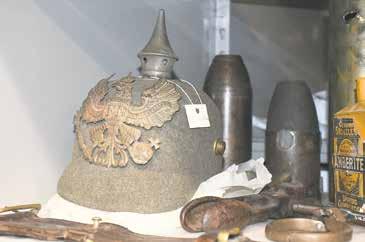






Area students put their creative talents to work for this year’s regional Heritage Fair, as their projects ranged from the moose to community businesses to lacrosse to surviving a plane crash.
The Western Development Museum hosted the event on May 14, with more than 80 students from the Moose Jaw area producing 60 projects using cardboard posters and props to accompany their presentations.
The top three winners will attend provincials on Wednesday, June 4, in Regina.
A miraculous tale of survival
Sloane Willner, a Grade 8 student from Davidson, focused her project — “Luck, Skill, and Miracles” — on a plane crash from May 5, 1979, where the aircraft left Estevan and crashed into Idaho state’s mountains.
On that plane was her great-great uncle Don Johnson, 50; his daughter Donna, 17; his son-in-law Brent Dyer, 24, who was married to another daughter; and pilot Norm Pischke. Don and Norm died, while Donna and Brent

a book that Canadian journalist Peter Gzowski wrote. Photo by Jason G. Antonio
Jason G. Antonio - MooseJawToday.com
survived with major injuries. For two weeks, they lived on the few supplies the plane carried — they ate toothpaste — before walking to find help.
The duo found an old mining camp and phoned the police, who took them to the hospital.
Willner explained that her mom suggested she focus on the story of Donna, who is her second cousin once removed. The youth thought it was a great story to tell since very few people knew it, although her friends were “super interested” once they heard the tale.
The Grade 8 student said her favourite part of the story was when a whisky jack bird — the Canada jay — visited the crash site several times and swirled around Donna and Brent as they walked for help.
“We kind of think that, ‘Well maybe that was Don,’ because he had succumbed to his injuries after the crash, so we kind of think that was a sign of the bird leading them out of the site,” Willner said.
Donna is still alive, but the student didn’t speak to her about the project. Instead, she relied on the book “The Sacrament,” by Canadian journalist Peter Gzowski, who interviewed the survivors. The family “strongly believes” the book accurately portrays what happened.
“There was a lot of miracles happening there,” Willner added.
A mooset interesting topic
Nora Mitchell, a Grade 4 student at Westmount School, dug into moose because she thought the animal was cool and wanted to learn more about it. Specifically, through reading books and browsing the internet, she discovered
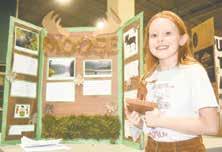
that the mammal has four stomachs and can live up to 20 years.
She said she had never seen a moose in person, but her parents have.
Meanwhile, this was Mitchell’s first year participating in the Heritage Fair and she had a great time making the poster board. She also enjoys history, especially learning about animals.
A rocky situation
Etnee Clarke, in Grade 6 at Kyle Composite School, focused her project — “The Moving Mountain” — on the town of Frank, Alta., in the Crowsnest Pass, which was founded in 1901 and then nearly destroyed on April 29, 1903, after a landslide hit.
Accompanying the student’s presentation was a diorama with several cardboard homes, Lego people, and a miniature mountain that allowed her to pour rocks down the slope onto the town.
She explained that she chose the topic because her family drove by the site many times while on camping trips. Her dad told her about the incident, while he took the family to the interpretive centre.
“I thought (the story) was really
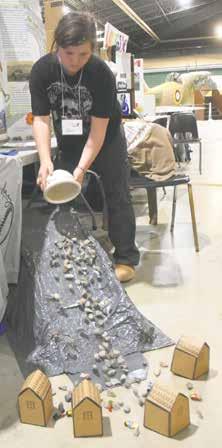
devastating and sad, but also I found it really cool to learn about,” the youth said.
Two interesting things Clarke learned about the rockslide are that 15-month-old baby Gladys Ennis survived the event and died in 1997 at age 94, while two weeks before, miners felt the mountain tremble but didn’t think it was anything to worry about.
By MooseJawToday.com staff
The Moose Jaw Police Service (MJPS) has arrested a 43-year-old male and charged him with one count each of aggravated assault and break and enter with intent following a stabbing incident on May 11.
At approximately 8:15 a.m. on Sunday May 11, the MJPS responded to a report of a break-and-enter in progress at a residence on the 1200 block of Stad-
acona Street West.
Police responded to the residence and located an individual who had suffered multiple stab wounds. The individual was transported to the hospital by EMS and was treated for injuries. The person’s condition is stable.
The two individuals knew each other.
The suspect had fled the scene be-
fore the police arrived. With the help of the MJPS’s K-9 Unit and the community policing division, officers located and apprehended the suspect at a residence on the 200 block of High Street East. He was arrested without incident.
As a result, Thomas St. Pierre, 43, has been charged with one count each of aggravated assault and break and enter with intent. He appeared in Moose Jaw
Provincial Court on May 12 and was remanded to the Regina Correctional Centre.
Police continue to investigate the incident and may release more information once it becomes available.
Anyone with further information should contact CRIME STOPPERS at 1-800-222-8477 or the Moose Jaw Police Service at 306-694-7600.

Researchers know the first year of a child’s development is important, but they are realizing that there are benefits to intervening in the second year with high-quality care and education.
Dr. Mark Tremblay from the University of Ottawa was one of seven speakers during the recent “Believe In Our Future” International Early Learning Conference at the Temple Gardens Centre.
The “first 1,000 days” in kids’ lives is the time between conception and the end of their first year, while “the next 1,000 days” is when children reach age four, with this second period critical for physical, cognitive and social development, Tremblay explained.
Most researchers focus on the first half, but focusing and building on the second half is just as important since this is when children gain autonomy and “develop like crazy,” he continued. Their care “switches from being predominantly health-based to being early childhood education-based.”
Many children worldwide don’t receive the nurturing care they require during their first 1,000 days, so the opportunity exists to put them on a healthy trajectory, which will provide dividends
Jason G. Antonio - MooseJawToday.com

for the rest of their lives if educators are successful, said Tremblay.
Environmental factors
In home environments, the quality of stimulation and caregivers’ behaviours and knowledge contribute to better child outcomes, he continued. Further, parents — who play a critical role — need to provide regular support, fathers must be present and violence must be prevented.
Nearly 54 per cent of children ages three to five worldwide are enrolled in Early Childhood Education (ECE) programs, with disadvantaged or marginalized children seeing larger gains and boys and girls benefiting equally, Trem-
blay said.
Furthermore, pollution and climate change cause developmental delays in psychomotor, communication and socioemotional skills, while second-hand tobacco smoke contributes to poor cognitive performance and behaviour, he continued.
Water contamination and chemical and heavy metal pollution are problematic, and while low-income countries may not be aware of these issues, Canada is and still uses pesticides — a neurotoxin — for activities like keeping golf courses green, Tremblay continued.
Indoor environments can be just as harmful since many objects are coated with long-lasting fire-retardant sprays that leach into children who are teething, he said.
International data
Tremblay then discussed data from the International Development Early Learning Assessment (IDELA), which assesses children ages three to seven in low- to middle-income countries.
He noted that children with no access to early learning or responsive care are 0.3 to 0.5 points below baseline, but those who have access to ECE, learning materials and high stimulation are 0.3 to
0.5 points above baseline. This equated to roughly two years of advanced development.
Data shows that children with at least one year of ECE were 0.13 points higher in math than those who didn’t and were 0.16 points higher in reading than those who didn’t. The scores continued to increase for children who had more years of ECE access.
The cost of ECE programs
What Tremblay found interesting was only 40 per cent to 59.9 per cent of Canadian children ages three to five participate in ECE programs, while countries like Russia, Brazil and Australia have 100-per-cent participation rates. So, this situation allows researchers to study and conduct cross-country comparisons, both between high-income and low-income nations.
Research says that providing universal access to ECE is ‘a fantastic investment. (However), it’s outside of the range of interest of most politicians because it’s an investment in the future,” Tremblay added. “Sometimes the best gains are going to be 20 or 30 years down the road but make no mistake that it is the best investment we can make.”
The 73rd Moose Jaw Band and Choral Festival concluded on May 15, marking its largest turnout to date with over 4,500 student musicians who travelled from across Western Canada to visit the Friendly City.
The four-day event once again transformed the city’s downtown into a vibrant hub of music, learning, and community spirit, as it has since the “Band City” days.
“Every year (the Band and Choral Festival) gets bigger,” said festival chair Janie Fries. “In 2019, we added a third concert band venue, and we (continue) to extend the length of our days to fit everybody in.”
This year’s festival featured 112 ensembles, including concert bands,
jazz bands, and choirs, performing at the Mae Wilson Theatre, A.E. Peacock Centennial Auditorium, Hillcrest Apostolic Church, Zion United Church, and St. Aidan Anglican Church.
The popular “Moosic in the Park” series returned to Crescent Park, offering free outdoor performances that drew spectators — and well-deserved praise from Fries.
“The weather held out until the middle of Wednesday afternoon, just in time for the last band to play their last note,” she said. “The audience in the park was (also) excellent.”
The festival was a memorable experience for many. Darieus Brass, a Grade 6 student from Sturgis, Sask., shared his enthusiasm. “I really liked (a piece we
played, called) ‘Mechanical Monsters.’ It’s a fun thing to do,” he said about the festival.
The influx of visitors had a noticeable impact on the city. Mayor James Murdock toured some of the festival venues with Fries on the morning of May 14 and witnessed an overall positive atmosphere.
“I was talking to parents from Winnipeg, Brandon, Edmonton, and Calgary who were just in awe of the treatment (and)... the welcomeness that they were receiving here in Moose Jaw,” Murdock said. “And I think the great thing about music is that music brings people together.”
Murdock also received several
comments from parents, who praised the accessibility and friendliness of the city. “Parents from Edmonton, Calgary, Winnipeg — they couldn’t believe how safe and walkable everything was,” he said. “The kids were giving themselves tours of the city. That’s what makes this festival special.”
Some families stayed as far away as Regina due to local hotels being fully booked, a testament to the festival’s economic impact. Donna Fritzke, executive director of Tourism Moose Jaw, noticed the difference — although it’s still too early to fully appreciate this impact.
“We’ve had busloads of children coming to see Mac the Moose, and that’s
Continued on next page
pretty fun,” she said. “Seeing families and kids downtown, it’s a great indicator of the festival’s footprint before the numbers even come in.”
The festival also received national recognition this year. The Canadian Band Association presented the Community Builders Award to Fries and Rick Evans of the Kinsmen Club for their longstanding contributions. “It (was) a lot of work, but it (was) so worth it,” Fries remarked.
Glitch list
Before the festival committee begins plans for 2026, it reviews what Fries dubbed the “glitch list” — a catalogue of things that didn’t go just right.
“There’s always some way to make (the festival experience) better,” she added. “But one thing that never changes is the Moose Jaw spirit.”
A new evening concert was held at Zion United Church this year, based on feedback from past participants. “It was a beautiful space with wonderful acoustics; it really worked for us,” she said.

While music remains the heart of the festival, it takes a dedicated community working behind the scenes to keep everything running smoothly.
All said, the event left a lasting impression on attendees and was widely considered a success.
“I had a phone call from a director in Saskatoon today, and this was her first festival…,” Fries recalled. “And she only came to our festival because another festival that she had planned on going to… had to cancel because of the weather.”
As a testament to the festival’s draw, she called Fries after returning home and “said, right off the bat: ‘We’re coming back.’”
Even with ongoing downtown construction, participants remained enthusiastic. Fries pointed to the example of one group from Winnipeg that had never left their hometown before the festival.
“They were just here for the experience — and they had a great time,” Fries added. “I truly believe some of them will come back to Moose Jaw as adults.”
“We probably had about eight (additional volunteers) show up (this year), and they weren’t just one-and-done. Most of them came back two or three times,” Fries said. “We needed people who could go up and down stairs, carry gear — and they did it. That was huge.”

The Born to Be Arts Academy is preparing to raise the curtain on its senior production of Guys & Dolls, set to run May 22 to 24 at the historic Mae Wilson Theatre in downtown Moose Jaw.
The show will feature a cast of 42 student performers and a crew of 20, with youth representing every high school in the city. Performances are scheduled for 7 p.m. on May 22 and 23, with two Saturday performances starting with a 1 p.m. matinee and then one last performance starting at 7 p.m. on May 24.
Set in 1950s-era New York City, Guys & Dolls is a high-energy musical comedy following the romantic entanglements of gamblers, missionaries, and showgirls. The story centres on Sky Masterson, a slick gambler who makes a bet that he can win over the straightlaced Sarah Brown, while Nathan Detroit scrambles to find a location for his illegal craps game — all while dodging marriage to his long-suffering fiancée, Miss Adelaide.
The production will showcase some of Frank Loesser’s most iconic tunes, ranging from the comedic tunes of “Adelaide’s Lament” and the show-stopping energy of “Sit Down, You’re Rockin’ the Boat” to the timeless favourites of “Luck Be a Lady” and “A Bushel and a Peck.”
Dolls’

“It’s a very typical love story — bad boy meets good girl,” said director Jessika Kopp. “It’s a comedy, so it’s fantastic. We’ve made it very family-friendly, so kids all the way to adults will really enjoy it.”
Kopp, who also directs the academy, said one of the production’s standout features is its choreography, including swing dance routines and aerial flips.
“We’re really challenging our boys this year,” she said. “We have a very
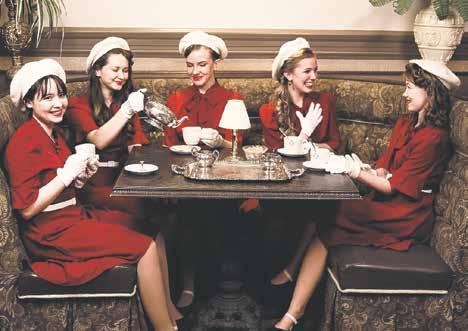
large number of boys in the musical, which you don’t normally see, and we really like to encourage boys to check out theatre — because we need them.”
The Born to Be Arts Academy, which currently includes around 500 students, prides itself on inclusive opportunities for young performers. Kopp said Guys & Dolls brings together young leaders in their respective school theatre programs to collaborate on one major community event.
“It’s like a super production,” she said. “These are very, very talented kids.”
The student-led crew also took charge of props and set design. “(These students) designed all the props themselves, made them, and painted them,” Kopp said. “It’s really cool to have (props and set pieces) made by teenagers.”
With the stage set and the spotlight waiting, Kopp’s hope is that residents will rally behind Moose Jaw’s next gen-

eration of rising stars.
“Moose Jaw has always been really good at supporting local talent,” she said. “We want to encourage people to come out and support these kids in their pursuit of theatre. I think Moose Jaw is one big family.”
Tickets are available online at MooseJawCulture.ca and in person at the Mae Wilson Theatre, located at 217 Main Street North. Kopp confirmed that tickets will be available for purchase right up until showtime.
Born to Be Arts Academy is located at 52 High Street West and can be reached at 306-631-5938. For more information, visit BornToBe.ca or follow “Born To Be Arts Academy Moose Jaw” on Facebook.




Heater & Fan
Alarm System with Remote Fob
Backup Camera
LCD Display & Media Center
(Radio, MP3/MP4, Bluetooth)
Headlight, Signals Lights, Horn
Adjustable Position Driver Seat with Seatbelt

Rear bench for
or passenger
Opening Side, Rear & Roof Windows
Locking Doors
Windshield Wiper
Stylish Beige Interior with Leather Seat
Daily Sudoku Puzzles by KrazyDad, May 14, 2025







Can you find the hidden words? They may be horizontal, vertical, diagonal, forwards or backwards.
9 2 6 8 2 7 5 4 3 8 6 7 5 6 9 1 4 6 5 3 4 3 3 9 5 4 6 7
© 2025 KrazyDad.com
Fill in the blank squares so that each row, each column and each 3-by-3 block contain all of the digits 1 thru 9.
If you use logic you can solve the puzzle without guesswork.

took
of
ABOUT, ARCS, ARRIVAL, BADE, BEAUTIFUL, BLEACH, CLIMB, CORRECTION, DAIRY, DALE, DENTAL, DRAIN, FAVORABLE, GRAVY, INFRACTION, LOCAL, MERCY, MONTH, NOISE, OFFENSE, PAGES, PLANT, POISE, PORCH, RATHER, RUGBY, SEARCH, SPLIT, STRICT, TWIST, WAIST, WATCH, YELLOW
ACROSS
1. Constructed
5. Foam
Need a little help? The hints page shows a logical order to solve the puzzle. Use it to identify the next square you should solve. Or use the answers page if you really get stuck.

10. Responsibility
14. Ends a prayer
15. Keen
16. Dwarf buffalo
17. Tuberculous
19. Flat-bottomed boat
20. Estimated (abbrev.)
21. Rose dye
22. Beach souvenir
23. Preordain
25. Ice or steam
Finish
28. Pushed forcefully 31. Footwear 34. Wept
35. Avenue (abbrev.) 36. Taxis
37. Australian “bear” 38. Comportment 39. Beer
Sorceress 41. Metallic-sounding
42. Getting dressed and ready
44. Depression
45. Japanese dish
46. Nervous
50. Boasts
52. Cranium
54. Downwind
55. Breathing organ
56. Producing sound
58. One single time
59. Portion
60. Abbey area
61. Noxious plant
62. Aromatic compound
63. P P P DOWN
1. Paired 2. Entertain
Arrears
East northeast
Not first
Hesitate
Type of fruit
In the meantime
Be mistaken
Sprints
Unsure
An implement
13. Small two-master
18. Harnesses
22. Wall upright
24. T T T
26. District
28. Small amount
29. Not odd
30. Declare untrue
31. “Go away!”
32. Angelic headgear
33. Bow or curtsy
34. Certain type of steroids
37. Friends and acquaintances
38. Baseball glove
40. British tax
41. What a book is called
43. Dragged (along)
44. Take by theft
46. Breakfast beverage
47. Run off to wed
48. Employ again
49. Affirmatives
50. Hard punch
51. Ancient alphabetic character
53. Make a sweater
56. South southeast
57. Blame
Looking To Rent - Garage/warehouse/ or unused semi-trailer unit. Prefer downtown area. Will consider other options. Can be reached at 306-684-1084.
I pay cash for unwanted firearms, ammunition, and other firearm related items. Also, free pick up of unwanted yard, garden, and acreage equipment, chainsaws, ATV’s, snowmobiles, etc. Call of text 306-641-4447.
I pay cash for unwanted firearms and ammunition. Call Wayne at 306-690-4864.
Moving jobs done reasonably: appliances, furniture, dump runs. Call to do it all. $45.00 a load. 306-630-2268
Need work done? Contact Bill at 306-630-2268 . Interior/exterior, renovations, formwork, framing, finishing, tiling, painting and all construction, roofing/siding- no

job too big or small. Reasonable rates, 30 years experience.
Cleaner with 20 years experience available for spring cleaning and move out cleans. Please call Rebecca at 306-990-0387.
Junk to the dump in and around Moose Jaw, $60 and up. Will pick up, move, haul, and deliver any appliances, tvs, furniture, or anything large in and around Moose Jaw, $45 and up. 45-gallon plastic barrels, great for rainwater, $20 each. 1000 Litre plastic totes - $60. 306-681-8749
Carley’s Cleaning Services for residential, commercial, move outs/ins, insured and bonded, affordable rates, reliable services, discounts for seniors, free quotes call 306-513-9999

6 metal poles 14’ x 3” heavy wall steel only $100. each, it’s a steal of a deal. Call 306-694-1322.
115 MOTORBIKES & SNOWMOBILES
ATV Quad for sale: 2024 CanAm Outlander Max XT 700. 450 miles, comes with winch and windshield. $11,900. Warranty until December of 2025. Please call 306-250-5271. Located in Moose Jaw.
105 AUTOS
LOST CONTACT with 1970 Volkswagen Beetle owner, west of Moose Jaw, down Caribou W. Please call 306-526-0016
120 RV’S & MARINE FOR SALE - 2003 13 Ft. Trillium
Camping Trailer, in good shape. $10,000 OBO. Please call Dave at 306-630-1579.
175 FARM
Tomato Plants for Sale - Locally grown, 9 varieties, $4 each. Can pot for an additional charge. Please call 306-526-0016.
WANTED - Unwanted rhubarb plants, will dig if required. 306526-0016.
Senior Living Condo for RentPoints West Retirement Centre, 917 Bradley Street, Moose Jaw, SK. Friendly, warm, home like

atmosphere, open floor plan with large living room, full self-contained kitchen, 2 bedrooms with walk-in closet, balcony, corner unit with beautiful view in 3 directions, ensuite washer and dryer, individual thermostat for heating or cooling, garage available, large and bright dining and common area floor plan, entertainment and bistro facilities, monthly or individual meals available, shuttle service available. For more information or viewing call: Dan 306 6311669, Judi 306 6310742

FOR SALE BY OWNER - Buffalo
Pound Lake cottage, 775 Lakeside Dr. Completly renovated, 2 bedrooms, turnkey, screened sunroom, fully landscaped. Please call 306-693-2255 or 306630-7771.
NEW Airbed $100. NEW queen size memory foam mattress topper $100. Card Sets. Please call 306-693-9023.
GARAGE SALE - 286 Wellington Dr. Thursday May 22, Friday May 23, Saturday May 24 from 9am to 2pm. Featured items: sports cards, household items, tools, toys, jewellery, books, and so much more!
GARAGE SALE - 49 Flax Rd. Saturday, May 24, 9 am to 1 pm. Downsizing - framed pictures, books, magazines, kitchen utensils including SS double kitchen sink.



manpower
natural
This is part two of four in a series that will run over the next four weeks. Jason G. Antonio - MooseJawToday.com
The Times-Herald newspaper’s special supplement on May 8, 1945, celebrating the end of the Second World War in Europe provided an in-depth look at Canada’s efforts at home and abroad.
“Our army shares in great victory,” read one headline, noting that “Canadians played (a) leading part in (the) toughest battles of (the) European war.” These battles occurred in the hot, blistering sun of Sicily and Italy and the rain, cold and mud of France, Belgium, Holland and Germany.
Some major battles included Dieppe in August 1942, Sicily in July 1943, the Italian campaign from September 1943 to January 1945, Ortona, Italy in December 1943, the D-Day invasion in June 1944, the Battle of Normandy from June to August 1944, campaigns in the Netherlands from late 1944 to early 1945, and northern Germany in spring 1945.
The supplement also had a full page describing how pilots “found their wings over the rolling Prairie” while training with the British Commonwealth Air Training Plan from December 1939 to early 1945. This program turned out more than 131,000 airmen from Canada, New Zealand, Australia, South Africa, Poland and elsewhere, while it led U.S. President Franklin D. Roosevelt to dub Canada the “aerodrome of democracy.”
There were hundreds of training sites across Western Canada, with Moose Jaw hosting No. 32 Elementary Flying Training School, a Royal Air Force school, from 1940 to 1944.
The front lines
The newspaper supplement had an article featuring comments that were “informal, homey and, at times, ‘straight from the shoulder’” from Maj. Ed Hudson, 1st Battalion, Black Watch, who spoke to the Rotary Club at the Grant Hall Hotel a day before V-E Day.
Hudson — wounded twice in Italy and once in


Belgium — discussed a letter he sent to the next-ofkin of his company, and while reading extracts from the letter, he interspersed many stories of incidents from the front that, “alternately, gave place to a solemn hush or nearly ‘raised the rafters’ because of their delightful humour.”
The letter discussed the soldiers’ celebrations of Christmas Day 1944, although they only had Christmas supper on Jan. 7, 1945, since “such is life at the front within gun range of your friend, the enemy,” as Hudson put it.
Yet, the Canucks wouldn’t let “Jerry” stop them from celebrating in the traditional Canadian way, he said. They created a banquet room in a battered house that used to be three storeys but had been “so well ventilated” by shells and bullets that it was now one storey.
The cook sent word at 2:30 p.m. that dinner was ready, while the padre was present to say grace after he “sneaked up the back way to see us” since it took him more than an hour to reach the building.
Then, despite being in a war zone, for over three hours, the men grabbed their food in groups and ate turkey, pork chops, potatoes, peas, stuffing, brown gravy, Christmas pudding, rum sauce, tea, cake, cigarettes, chocolate bars, chewing gum and “a real orange.
The officers and senior NCOs washed dishes and served the men, while the padre served the potatoes and peas since the soldiers felt they “couldn’t trust him with the rum sauce.”
“If you could only have seen the eyes of those men, it would have repaid you a million times over for the parcels, as it paid us for our efforts,” said Hudson.
Despite the “thunder of guns and death walking almost within hand’s reach,” Santa Claus did not overlook “the jolly little party” because every man received a bag with an apple, 115 Canadian cigarettes, chocolate bars, nuts, chewing gum and candy.
The event concluded with a Highland dance, beer, a movie and a group picture.
The home front
Meanwhile, on the home front, the war showed how Canada’s “vast natural wealth” was vital to the world’s peace since the Dominion’s supply of food, minerals and laboratory production “greatly expanded” during the conflict.
The article indicated that Canada had the world’s third-largest forest land, which provided the raw materials for products such as Mosquito bombers and fuel wood. This yield of pulpwood increased by over 200 million cubic feet during the war.
Furthermore, Canadian mining reached new highs as the Dominion led the world in producing asbestos, nickel, radium and platinum and was second in aluminum, gold, mercury and molybdenum.
Moreover, Great Britain’s wartime demands for food kept Canadian cattlemen busy providing that market with beef, bacon and other meats, while new agreements assured the producers that they would have access to that market for a long time.
Britain’s biggest needs were for meat, dairy products, eggs and poultry. These requirements increased Canadian cattle production by 32 per cent and hog production by 123 per cent.
Meanwhile, data from 1944 showed Canadian citydwellers produced 60,500 tons of vegetables from their 226,000 Victory Gardens, farms produced 458,240,000 bushels of wheat, an increase of 60 per cent from the previous year, and Canada produced 40 billion kilowatt hours of electricity, with one-twentieth of that going to the United States.






Rev. Dr. John Kreutzwieser is a retired pastor from Emmanuel Lutheran Church, Moose Jaw, SK. He graduated with a doctorate degree in 2006 from the Robert Webber Institute for Worship Studies in Florida.
The views and opinions expressed in this article are those of the author, and do not necessarily reflect the position of this publication.
Solivagant means rambling alone. When you go for a walk, wandering by yourself, with no planned route, you are a solivagant. This is derived from the Latin word solivagus which means wandering alone, from soli (alone) plus vagus (wandering). He was too much of a solivagant to stick with the group on field trips. When it comes to golfing, I am not a solivagant player, I enjoy company and following the numbered holes.
The sense of solivagant leads me to think of shunpiking. Back in the 1960s, a southwestern Ontario Sunday drive, with no fixed destination, was labelled shunpiking. Originally, shunpikes were known in the United States in the mid-1700s. Samuel Rice built a road over the Hoosac Range Massachusetts. A few years later a road for stagecoaches was built through the range. However, it charged a toll for usage, subject to control of the Turnpike Association (1797). Those desiring to avoid the turnpike fees took the Rice Road, which became labelled a shunpike. Over time, shunpiking came to mean an avoidance of major highways, regardless of tolls, in favour of lightly traveled country roads. That is how my father liked to drive.
Filipendulous signifies something suspended by or strung upon a thread or thin cord. You might envision a car tire suspended by a rope, hung on a tree limb, as a makeshift swing. It comes from the Latin words filum (thread) and pendulus (hanging). Filipendulous began in the field of botany, to describe structures in plants
that are suspended or hang on fine threads or stalks, in the 1860s. Later the word was used for anything dangling overhead. Lisa Liebman wrote in Artforum International (December 1977), “The building looks grand, and the collection (particularly the nineteenthcentury stuff) is fun, but two gargantuan, coloredglass chandeliers in the main lobby are outrageous, filipendulous affairs that extend some twenty feet across, nearly touching our heads, and whose bumpily pregnant forms evoke cornucopias, pinatas, and Santa’s bag of presents.”
Deipnosophist is a person skilled in table talk, in others words, a great dinner party guest. The word comes from the Greek word deipnosophistes, meaning one learned in the mysteries of the kitchen. The Greek root words are deipnon (dinner, chief meal) and sophistes (wise man, master of a craft). Athenaeus (Greek Egyptian writer of the 2nd century AD) entitled a book depicting a banquet where long discussion took place, Deipnosophists. “His Table you might well call a repast for the ears as well as for the belly, not unlike those Attick Nights, or the Banquets of the Deipnosophists, at which men might feast their mindes and intellects no less than their bodies,” penned William Winstanley in England’s Worthies (1660).
Scripturient means having a strong urge to write. This word comes from the Latin scripturiens, the present particle of scripturire, meaning to desire to write, based on scribere (to write). I guess you might say that I am a scripturient, as I feel compelled to script this weekly column as something to write regularly in my retirement.
Sialoquent originated in the heads of 17th century lexicographers to suggest a person that spits much in his speech. It was listed by Thomas Blount in his book Glossographia (1656). The word comes from a combination of Greek and Latin roots. The Greek word síalon means spittle or saliva. The Latin loqui means to speak. Sialoquent translates to speaking with spittle or chattering with saliva. A sialoquent describes someone who speaks in a way that involves excessive spitting. As they say, sit in the front row of a theatre production at your own risk.
Opsimath is a person who begins to learn late in life. It is derived from the Greek words mathes (from manthanein meaning to learn) and opse (late or later). In August 2024 Jasmine King of Edmonton learned to skydive at 100 years old. Chrissie Miller from
Glasgow, Scotland flew a hot air balloon after turning 100. I have attempted to learn the play the piano after my retirement but I’m not much of an opsimath, I guess.
Recogitate means to think over again. This is something most of us could benefit from regularly. It comes from the Latin cogitare meaning to ponder or meditate on intently. I will recogitate my decision and get back to you tomorrow.
About 1,000 new words are added to the English language each year. These can be words that are newly created and words that gain new meanings. Adding new words to an existing language, or dropping old ones is something people have always done. Longevity often depends upon frequency of usage.
Columnist John Kreutzwieser loves to research words and writes this weekly Word Wisdom column for Moose Jaw Express/MooseJawToday.com. He has an interest in the usage, origin, and relevance of words for society today. Greek and Latin form the basis of many words, with ancient Hebrew shedding light on word usage.
John would like to know if anyone has a sincere interest in a relevant word that he could possibly research for an upcoming column. If so, please send your requests to wordwisdom2021@gmail.com . Words will be selected according to relevance and research criteria. We cannot confirm that all words will be used.



Shirley Ann Daniel (nee, Miller) passed away peacefully at Wintergreene Estates, Regina, SK, on Friday, January 31, 2025, at the age of 96 years from a stroke.
Born and raised south of Avonlea, SK. Shirley nursed before marrying in 1949, becoming an integral part of the Daniel family farm north of Avonlea, where she was a partner in the farming operations until retirement to Moose Jaw. Shirley was very dedicated to her family and as a lifelong volunteer she served in improving her communities in various capacities. She was an active member of the United Church, Eastern Star, School Board, Avonlea Historical Book and Homecoming Committee and was involved in sport, recreation activities and festivals, serving various capacities. She was instrumental in creating the Miller Family Record Book and Family Cookbook. Preservation of history and genealogy was important as was her passion for enhancing the health sector in attaining a quality of life for everyone from birth to end of life. She received recognition for her exceptional commitment in volunteerism and fundraising for the Moose Jaw hospitals and was honored as a Life Member of the Auxiliary. Proudly Canadian, Shirley held admiration for her father, brother and all those who served in the military. She cherished all her time with family and friends, whether berry picking, camping, exploring new and old places, attending functions or as an enthusiastic supporter of sport events or just visiting. One of her treasured travels was representing Canada in South Korea and Japan. Shirley's Irish ancestry spirit shone in her work hard ethic, vibrant energy, love of music, and great sense of humor and zest for life attracting friends wherever the journey of life took her. Shirley created a home of love and warmth where everyone was welcomed and always lent an ear and encouragement. Embracing her positive supportive attitude, would lighten up the days for many- right to the end.
Shirley is predeceased by her husband Peter Junior Daniel; parents Jeanetta and Thomas Miller; sisters, Audrey Sovdi (Lloyd), Reta Waugh (Ralph); brothers Rodger Miller, Stanley Miller (Margaret); and son-in-law Ken Harley. Shirley is survived by daughters Judith Harley of Nokomis, Mary Lou Daniel (Bob Wynia) of Sherwood Park, Lana Daniel (Carl Neggers) of Regina; sons Peter Dwain Daniel (Joan) of Candle Lake, David Daniel of Moose Jaw and Glen Daniel of Avonlea. Shirley enjoyed eight grandchildren, 14 great-grandchildren and many cousins, nephews and nieces of which all were special to her.
Celebration of Shirley's Life will be held at the Community Hall, Avonlea, SK, on Saturday, June 28, 2025, at 11:00 a.m. Donations in Shirley’s memory may be made to the Heart and Stroke Foundation, Hospital Auxiliary or any United Church of your choice. To leave an online message of condolence, please visit www.speersfuneralchapel.com


It is with heavy hearts that we announce the sudden passing of Vernon (Vern) Harvey Reaburn on Monday, May 12th , 2025. Vern was a proud and loving father, grandfather, great-grandfather, great-great-grandfather, uncle, brother, and friend. Vern had a zest for life and a genuine love for people of all ages and was always ready for a conversation. At just 18, he began his career with the Royal Canadian Air Force as an Air Traffic Controller in Moose Jaw, SK. His service took him across the country and abroad, with postings in St. Jean, Quebec; Rockcliffe/Ottawa, Ontario; MacDonald, Manitoba; Goose Bay, Labrador; Baden-Baden, Germany; and back to Moose Jaw, where he retired after 20 years of dedicated service. Following his military career with the RCAF as an ATC, Vern continued to serve the public through his work with the Saskatchewan Film Classification Board, the Saskatchewan Department of Justice and Corrections, and later with the Commissionaires, primarily at the Regina Airport. An adventurer at heart, Vern earned his pilot’s license, became a member of the Regina Flying Club, and served as a past president. He was also a proud member of the Masonic Lodge and the Wawa Shrine Temple Klown Corp, where he volunteered as a clown. He served as deputy sheriff with the Regina Buffalo Days Rowdy Gang. A passionate sports enthusiast, Vern participated as a player, coach, and official. He also loved reading, movies, and travel — especially visiting family in Owen Sound, ON and vacationing in Cuba. Vern was grateful for the love he experienced in his two marriages — first to Ethel Shreeves in 1958, and later to Myrna Pfingstl (Fiesel) in 1981. He held both dearly in his heart and often spoke of them with great fondness. He was predeceased by his parents, Alfred Reaburn and Ada Emke; brothers: Ken, Jim, and Gord; and niece, Kim. Vern will be lovingly remembered by his son, Ross (Glennys); granddaughters, Amanda (Greg) Olson and Samantha Reaburn; great-grandsons: Sebastian, Liam, Lucas, McCoy, and Justin (Kamree); great-granddaughter, Taylor (Evan); greatgreat-granddaughters, Meah and Kacey; nieces: Barb, Cheryl, Linda, and Bonnie, and their families. He is also survived by his stepchildren: Nancy, Mike, and Kevin, and their families; as well as many friends. We wish to thank the paramedics that attended to his accident and to thank the health care professionals at the Regina General Hospital for their care for him in his last days. A celebration of Vern’s life will be held later at a date yet to be determined.
Arrangements are entrusted to Moose Jaw Funeral Home, 268 Mulberry Lane. Gary McDowell, Funeral Director 306-693-4550 www.moosejawfuneralhome.com
Hope springs eternal in the human breast, Man never is, but always to be blest. -- Alexander Pope --



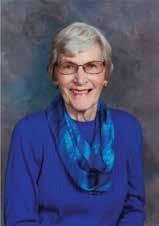
Dorothea Exelby, age 91, died on Tuesday, May 6, 2025 in Moose Jaw. She was born September 17, 1933 in Fox Valley, Saskatchewan. She graduated high school in Richmound and from RN Nursing at Grey Nuns Hospital, Regina, in 1955. Dorothy and Ross Exelby married in 1956 followed by 7 children arriving 1957-1966. Dorothy lived, nursed and raised her family with Ross at Craik until 2002 when the two retired to Moose Jaw. They enjoyed a neighbourhood of many retired farmers. After Ross passed, she moved into Points West where she made more good friends.
Dorothy was predeceased by her husband, Ross Exelby and her son, Dennis Exelby. She is survived by her children Terry Smith (Jim), Willie Exelby (Dianne), Dan Exelby (Kati), Gail Quinn (Stu), Margo Exelby and Tom Exelby (Kim).
Granny was adored by many grandchildren and great-grandchildren. She also leaves behind her sister Rose MacPhail and sister-in-law Esther Exelby.
A graveside service will be held at Craik Cemetery, July 4, 2025 at 2pm. A social will follow at Craik Community Hall.
In lieu of flowers, please direct donations to one of her preferred charities, Heart & Stroke Foundation or the Canadian Cancer Society.
Hanson’s Funeral Home of Davidson in care of arrangements.
Pastor Alex Allan is a Moose Jaw retired credentialed minister in the Church of God in Western Canada and has served as a hospital chaplain and is an experienced pastoral counsellor. He has an extensive background in communications, having worked in radio, television and print media.
We are blessed when we take time to meet the needs of others. It’s a biblical principle.
Listen to the words of Jesus in Matthew 25:35 For I was hungry, and you fed me. I was thirsty, and you gave me a drink. I was a stranger, and you invited me into your home. When we care for others, we become an extended arm of the Lord.
He has called us to serve Him on earth and we do that by reaching out to others with the love of Christ.
It is important we understand that when we reach out to others, we are fulfilling God’s call on our lives.
I am blessed to know people who show the love of God through their efforts to minister to the less fortunate. They do this by donating their time, skills and resources to provide daily meals and shelter for those who struggle in our community.
When we look at the ministry of Jesus, we see that feeding the hungry was important to Him. In the Gospels we read about Him feeding multitudes of people.
Matthew 14:15,16 That evening the disciples came to him and said,

• Roast Beef Supper • Guest Speaker • Live Auction • Silent Auction • Penny Parade
Deadline for Tickets May 31 st
$35 Tickets
Cocktails at 5pm | Supper at 6pm

“This is a remote place, and it’s already getting late. Send the crowds away so they can go to the villages and buy food for themselves.” But Jesus said, “That isn’t necessary—you feed them.”
We are not to look for excuses to ignore the hungry but rather exercise faith and compassion when it comes to meeting their needs. We are to do it willingly and joyfully as unto the Lord.
In the case of the multitude with Jesus, He took five loaves of bread and two fish, blessed them, and the people were fed.
During 9/11 the community of Gander, Newfoundland invited thousands of stranded travellers into their homes. With open arms they clothed, fed and looked after them. The local folks were not forewarned but gladly shared what they had and cared for almost 7,000 people in need.

That’s what God calls us to do. Willingly care for those in need. Galatians 6:9 So let’s not get tired of doing what is good. What could God do if we were to share our five loaves and two fish with others?
The excerpt above was extracted from a devotional book that was written to encourage individuals in their daily walk with Christ to provide practical guidance and encouragement. If you are interested in purchasing the book, please email RefreshingMoments@ outlook.com
If you would like your notice or event added to this list, contact us at: joan@moosejawexpress.com
STS Moose Jaw Superannuated Teachers Meeting will be held on Wednesday, May 21, 2025. LUNCHEON: 10:30 – 11:00 Coffee Chat – circulate and connect with past colleagues/11:00 – 11:30 Program: Cindy Divine – Qi Gong/11:40 – 12:30 Dinner: Roast Beef, Caterer: Charlotte’s/12:35 -1:15 Meeting, and Election for those of you who wish to stay. Cost: $15.00 per STS member and spouse. $25.00 for non-members. Please RSVP to Rosalie by Saturday, May 17, 2025, @ 306-691-0696, email stsmoosejaw@ gmail.com, or click on the link in your latest STSMJ Newsletter. (If you haven’t received your newsletter, please check your junk/spam mail or follow the directions on www.stsmoosejaw.com. Come and Enjoy! Watch for information on our Spring Social. NATIONAL ASSOCIATION OF FEDERAL RETIREES BRANCH 23 MEETING
May 22nd (Thursday), 2025 at 2 pm in card room, Tim Eaton’s, 510 Main St. N.
All members please attend. Guest speaker from Age Friendly Moose Jaw.
N.A.F.R. needs volunteers for Sidewalk Days, July 3rd, 4th, 5th. Call Sharon: 306-631-4236 for info. Town and Country Singles Dance will be held on May 24, 2025 from 7:30pm - 11:00pm at Church of Our Lady Community Center 566 Vaughan St. W. Moose Jaw. Band is Leon Ochs and the cost is $15.00 for guests or $13.00 for members. Come on out for an evening of fun! Married couples are welcome! Coffee and bottled water are supplied. For more information contact Marion at306-630-1492.
GARAGE SALE: May 30 from 1-6 p.m. and the 31st from 10 a.m.-3 pm in the Zion social hall at 423 Main Street North. Clean, good quality items are being accepted between May 13 to the 27th Whether you are moving, cleaning , or downsizing, please consider donating. Note that no large appliances, furniture, nor mattresses can be accepted. For details, please call the office at 306-692-3842.
1975 AE Peacock High School 50th Reunion June 13 &14, 2025 – 1975 AE Peacock 50th Reunion: Alumni and Friends. We are looking for former classmates and friends from 1975, and the years surrounding our time at Peacock High School. Email our celebration committee for more information, peacock1975reunion@gmail.com Please include your name and email address.
Lawn Bowling is a sport for all levels of ability. For more info for spring/summer and fall information please phone or text 306-630-8160 or visit www. moosejawlawnbowling.com
In Moose Jaw Parkinsons Support Group meet at 1:30 p.m. on the last Monday of the following months: April and May. Call or text 306 756 2819.
The Prairie Hearts Quilters Guild is held every 1st and 3rd Wednesday at 7 pm at St Andrews Church until May. Learning, comradery, fun challenges, quilting and Community Projects.
New Youth Pipe Band in Moose Jaw “The White Heather” for youth aged 8 to 12. Further information may be obtained by contacting Michelle Carline at mcarline@hotmail.com
The Moose Jaw Stamp Club will resume meeting on the 2nd and 4th Wednesdays of the month. The first meeting will be at 6:30pm, in Lindale School staff room, 1322 11th Avenue NW (north entrance). Phone 306-693-5705 for information.
Moose Jaw Town N Country Square Dance Assoc. Winter 2024 Program on Monday nights from 7-9pm at St. Mary’s School, 720 – 5th Ave. SW. Dance in a square with family and friends. For information contact Valerie Wright at 306.691.0579. Beginners, singles or doubles welcome!
Nature Moose Jaw will hold their meetings on a once-a-month basis to take place on the third Friday of each month
Church of Our Lady Bingo takes place at the Church of Our Lady Community Centre, 566 Vaughan Street on Tuesday evenings. Doors open at 6:00 p.m. Bingo begins at 7:00 p.m.
Are you struggling with addictions? Do you know someone who is? Or do you want to learn more about overcoming addiction to help others? Pastor Cory Havanka and his wife Brenda will be offering an inperson, small-group, course that will explore how to overcome addiction that is based on Biblical foundations. For questions - Call or text Cory at 306-6841464 or email firmfoundationministries.inc@gmail.com Firm Foundation Ministries provides other services as well: -Bible study - Monday evenings at 630 p.m/Prayer meetings - Wednesday evenings at 7 p.m/Pastoral counselling. Check Facebook or Instagram for updates on services, events, bible study notes and words from the Lord.
Nar-Anon Meetings every Monday 7—8pm (Moose Jaw Nar-Anon Family Group) is a twelve-step program for relatives and friends affected by someone else’s drug use and is in-person at Moose Jaw Alliance Church, 14 Neslia Place. Come in Main Doors – Meeting Rm 103. Your anonymity and what you say at meetings will be carefully guarded. Toastmasters is an internationally recognized (nonprofit) communication and leadership training provider. The Toastmasters self directed training in a supportive environment builds participants confidence in addition to the skill sets.
Big Country Club meet at Saskpolytech on Wednesday evenings @7CST. Virtual attendance is available on zoom. This spring we additionally are offering a condensed version of the training “Speechcraft”. For more info phone 306-630-7015 or Email. contact-3418@toastmastersclubs.org
Green Horizons Club meets Tuesdays @7pmCST on zoom. The recently renaming of TAP club reflects an addition to their mission - to empower members to advocate for any of the UN’s 17 sustainability goals. For info & the link email contact-1422@toastmastersclubs.org
TOPS (Take Off Pounds Sensibly) Weight Loss Support Group Meets at the Cosmo Senior Citizen’s Centre, 235 – 3rd Ave. N.E. The group meets every Wednesday morning. Weigh ins are 8-8:45 am. Meeting to follow. . scale weighs up to 350 pounds. Join for friendship and support on your weight loss journey. For more information go to www.tops.org
TOPS (Take Off Pounds Sensibly) offers meetings every Wednesday evening too in the Alliance Church located at the corner of 9th Ave NE and Thatcher Dr. Use the West side entrance and you’ll find us down the hall in room 107. Weigh ins are 6:30-7 followed by a half hour meeting. Scale weighs up to 500lbs. Join us as we support each other on our weight loss journeys. Visit www.tops.org for more information. Moose Jaw Public Library (MJPL), 461 Langdon Cres. Phone 306.692.2787. Visit their website at https://www.moosejawlibrary.ca or visit ASK@ MOOSEJAWLIBRARY.CA
Some library programs require registration by calling 306-692-8210 or emailing nsetter@moosejawlibrary. ca
CHILDREN’S PRGRAMMING:
BABY STORYTIME Tuesdays Time: 10:30 am Location: Children’s Program Room Ages: 0 to 2 and their caring adults! Drop-in Program
PRESCHOOL STORYTIME Wednesdays Time: 10:30 am Location: Children’s Program Room Ages: 2 to 5 and their caring adults! Drop-in Program
DAYCARE STORYTIME Thursdays Time: 10:30 am
Location: Children’s Program Room Ages: 2 to 5 and their caring daycare providers! Drop-in Program
LEGO WEEKENDS! Every Saturday and Sunday Time: Open hours Location: Children’s Department Ages: 4 to 12 This is a self-guided activity
MAKER SATURDAYS Saturdays, May 24 Time: 2:00 pm Location: Herb Taylor Room Ages: 8 to 12 Registration required TUMBLEBOOKS FOR KIDS
Online, anytime... TumbleBook Library is an online collection of animated, talking picture books which teach young children the joys of reading in
a format they’ll love. Access it for free with your library card!
YOUTH PROGRAMMING:
TEEN D&D: BUGBEAR COVE Group A Tuesdays, until May 27 at 6:30 pm/ Group B Thursdays, until May 29 at 6:30 pm for ages 12-16. Registration required
YOUTH PROGRAMMING:
TEEN ANIME+ CLUB Wednesday, May 28 Time: 6:30 pm Location: MJPL Theatre Ages: 12-19 Drop-in program Show: I Left My A Rank Party to Help My Former Students Reach the Dungeon Depths!
TEEN D&D: BUGBEAR COVE Group A Tuesdays, Apr 15 to May 27 at 6:30 pm Group B Thursdays, Apr 17 to May 29 at 6:30 pm Ages: 12 to 16 Registration required
ADULT PROGRAMMING:
TECH TIME Available by appointment during open hours in Main Library for adults by appointment only - please call the library at 306-692-2787 to schedule an appointment.
TEEN ARTS & CRAFTS Wednesday, May 21 Time: 6:30 pm Location: Herb Taylor Room Ages: Ages 1219 Drop-in program Project: Painted Plant Pots
DOCUMENTARY NIGHT Thursday, May 22 Time: 6:00 pm Location: MJPL Theatre Ages: Adults Dropin program Movie: Flee
MJPL MOVIE CLUB Monday, May 26 Time: 6:00 pm Location: MJPL Theatre Ages: Adults Drop-in program Movie: Viewer’s Choice *Voting will be open May 12 to 20
TECH TIME Available by appointment Time: Open hours Location: Main Library Ages: Adults By appointment only - please call the Library at 306-692-2787 to schedule an appointment.
MAGIC THE GATHERING Saturdays, May 24 & 31 Time: 2:00 pm Location: Reading Room Ages: Ages 13 and up Drop-in program MJ CHESS CLUB AT MJPL Sunday, May 11 Time: 1:00 to 4:00 pm Location: Reading Room Ages: All ages welcome Drop-in program
MAKER NIGHT Monday, May 26 Time: 6:30 pm Location: Herb Taylor Room Ages: 13 and up Registration required Project: Binding Custom Note Pads
The Royal Canadian Legion – Branch 59 Moose Jaw is making it’s move to their new location – 693 Fairford Street W. Please call to see when opening day is. Contact: 306-692-5453
Facebook @ ROYAL CANADIAN LEGION-Branch 59 Moose Jaw
Instagram: @Royalcanadianlegion59
BINGO – Monday @ 6pm
CRIBBAGE –Tuesday @ 1:30 pm - Please sign-in by 1pm
MEAT DRAW & CHASE THE ACE - Saturday @ 3pm - Everyone welcome Moose Jaw and District Seniors: For more information Call: 306-694-4223 or Email: Email: mjsenior@shaw.ca . The centre is now open MonThurs 8am – 8pm.
Fitness Level & Indoor Walking Track open MThurs 8am-8pm and on Fri 8am-4pm
Wood working area – Mon- Fri 8am – 4pm
Timothy Eaton Cafe open Mon-Fri 8 a.m. – 4 p.m. Cinnamon Buns on Thursday’s. Tuesday is pie day. Everyone is welcomed.
Billiards daily 8a.m. – 4p.m.; Monday & Thursday evenings 4:30 – 8 p.m.
Pickle Ball – Monday & Thursday mornings @ 9a.m/ Tuesday, Wednesday & Friday afternoons @ 1 p.m./ Monday & Thursday evenings @ 7 p.m./ Weds pickleball @5pm
Fitness- Chair/Low Impact Fitness Tuesdays 11:30 & Thursdays @ 1:00 p.m.
Cribbage – Wednesdays @ 1 p.m.; Whist – Tuesday @ 9:30am; Hand & Foot Card Game for Beginners – Thursday @9:30 am.; Mah Jong – Wednesday @1 p.m. Beginners is Monday @1pm; 500 Cards –Thursdays @ 1 p.m; Spades – Tuesday and Fridays 1pm ON HOLD
Full Body work out – Monday’s 10am
Scrabble – Monday’s at 1pm
Line Dancing – Tuesdays @ 10 a.m.
Intro to Line Dancing – Wednesday’s @ 11am
Art & Crafts – Monday, Tuesdays & Wednesdays @ 1 p.m.
Floor Shuffleboard – Tuesdays & Thursdays @ 1 p.m.
Paper Tole – Tuesdays @ 1 p.m.
Circle Dancing – Thursday 2:15pm
Nickle Bingo – Fridays @ 1 p.m.
Quilting – Every Friday 9am to 4pm Lounge – Friday’s from 2 p.m. to 4 p.m. Jam Sessions – Friday’s 9 a.m. Texas Hold’em - Thursday @ 6:30pm Floor Curling – Wednesday and Fridays @1pm
-
and 11:30am/ Pickleball 9am/Shuffleboard 1pm/Pickleball 3:45
: 9:30am-Jam Session/1pm-Pickleball/7pmFriendship Bridge/7pm-Beginners Only Pickleball/ Indoor Walking - 8:15am and 11:30am Wednesday: 8:30am-TOPS/8:30am-Pickleball/1pmFloor Shuffleboard/ Indoor Walking - 11:30am/Art Drop In - 1:00pm/Pickleball 3:45pm and Beginner Pickleball 7:00pm Thursday: 10am-Line Dance/1pm-Pickleball/ Indoor Walking - 8:15am and 12:00pm/ Hand/Foot Canasta - 1:30pm/Beginner Pickleball - 3:15pm and Advanced Pickleball - 6:30pm Friday: 9:00am-Beginner Pickleball/1pm-Regular Pickleball/ Indoor Walking - 8:15am and 11:30am Saturday: Advanced Pickleball - 9:30am and Pickleball - 1:00pm May 22nd Cosmo Barbeque Fundraiser from 5-6pm. Hamburgers, hotdogs, beans, salad, coffee & tea. Cost $15
Tuesday, May 27 - Protecting your Finances against Fraud at 1:00pm Moose Jaw ANAVETS: Army, Navy & Air Force Veterans Unit #252 – 279 High St. W, Moose Jaw. 306.692.4412 or anaf252@sasktel.net
Monday/Tuesday – Open 12 to 7 pm
Wednesday – 12 – 6 pm 10 card Crib and Smear Thursday – 12 – 7 pm Regular Crib and Smear Friday – 1 - 10 pm Pool and Darts (7 pm) Saturday – 1 – 7pm Meat Draw at 4:30 pm, 50/50 and gift cards. Everyone welcome. Get your dancing shoes out! Brandon and Company hit the stage Saturday, May 17th at 7 pm. May 31st – Golf Tournament at the Lynbrook. Please contact Marg, 306-630-7266 for more information. Cut off for entry is May 28th. Everybody is welcome. More information to follow. FRATERNAL ORDER OF EAGLES #3395 EVERY THURSDAY: Ladies Auxiliary “Meat Draw” – ticket sales start at 5:30 pm, draws start at 6:00 pm – Meat Draw, 50/50, “Chase the Ace”
EVERY SUNDAY: Aerie “Meat Draw” – ticket sales start at 2:30 pm – Meat Draw, 50/50, Mystery Draw, “Chase the Ace”
MONDAY THRU SATURDAY – DROP IN POOL – 1:00 pm to 1:30 start time. Singles and Doubles. Partners draw from those attending to play.
FIRST AND THIRD SUNDAY – Aerie meeting – 11:30 am
FIRST AND THIRD TUESDAY – Ladies Auxiliary meeting - 7:00 pm
DROP IN DARTS - Every Wednesday evening and continues until April, 2025 - $2.00 per person, draw for partners, starts at 7:00 pm.
DROP IN CRIBBAGE - Every Monday evening and continues until April, 2025 - $2.00 per person, registration between 6:00 pm and 7:00 pm – play starts at 7:00 pm.
Western Development Museum; 50 Diefenbaker Drive, Moose Jaw. For more information, visit the museum’s website at WDM.ca/Moose-Jaw. Call 306693-5989 or email ajones@wdm.ca
N.
Derek McRitchie REALTOR® (306) 631-1161
E.G. (Bub) Hill REALTOR® (306) 631-9966
Bill McLean REALTOR® (306) 630-5409
Tanya Minchin REALTOR® (306) 630-6231
Cassie Nichol REALTOR® (306) 631-0691
Justin Hammer
(306)684-4266







Students from Caronport’s Briercrest College and Seminary are preparing for a journey that blends language, culture, and calling, as they take part in the school’s first-ever semester-long Greek intensive program in Cyprus — designed to deepen their understanding of Scripture by encountering it in its original tongue.
The program offers 15 academic credits across five courses running from September to December. Students can expect a structured and immersive routine blending classroom learning with real-world cultural engagement designed to build linguistic fluency and interpretive skill.
Throughout the week, students will share meals with their hosts — a couple who operates a small hotel in the Cypriot mountainside described by Olmstead as “our informal instructors.”

Dr. Wes Olmstead, Henry Hildebrand Professor of the New Testament at Briercrest College, emphasized the significance of learning in a Greek-speaking environment.
“One of the non-negotiables as we began to plan this venture was that it be situated in a Greek-speaking context... to ensure that our students will have consistent interaction with native speakers in the early stages of their language learning,” he said.
While weekdays are devoted to study, weekends will offer a well-earned break from the program’s academic rigour. Students will have an opportunity to witness the natural beauty of the Mediterranean, and will visit Roman-era ruins, monasteries, and Byzantine churches adorned with frescoes and scriptural inscriptions, Olmstead explained.
“Our students will read texts that are separated by hundreds of years and emerging from various contexts, which means that they will naturally come to see Greek as a continuous language and come to appreciate both its strong continuity and its historical development.”
In particular, students will read, hear, speak, and receive the Gospel of John in its original Greek.
“Being uprooted from contexts that are familiar to us often helps prepare us to think about the world differently,” Olmstead said, noting that students will be able to study unencumbered by the need to break down passages or memorize long vocabulary lists.
“While we can of course read the Bible with profit in our own language, it is a beautiful gift to be able to encounter these texts in the language in which they were written.”
As the semester unfolds, the hope is that students will return not only with stronger language skills, but with a deeper sense of personal, intellectual, and spiritual growth shaped by their time abroad.
“We think that this semester in Cyprus will be significant for our students in all sorts of ways, some of which we probably can’t anticipate,” he said. “But we do expect it to be formative for them: personally, as they face the most intense academic challenge they have encoun-

tered yet and learn to draw on resources they don’t yet know they have; intellectually, helping them mature toward being wise readers of the Scriptures; relationally, as they live and work in close quarters with each other and have regular encounters with Cypriot villagers; and spiritually, as they begin to read scriptural as well as classical texts in the language in which they were written and as they encounter resources for worship from the ancient Church.”
While Briercrest College has previously offered short-term study trips to destinations including Israel, Turkey, and Greece, this marks its first semesterlength study-abroad program led by its faculty.
“I’m confident that there will be much for us to learn from Christians, and the long Christian tradition, in Cyprus,” Olmstead concluded.
To learn more about Briercrest College and Seminary, visit Briercrest.ca.















